






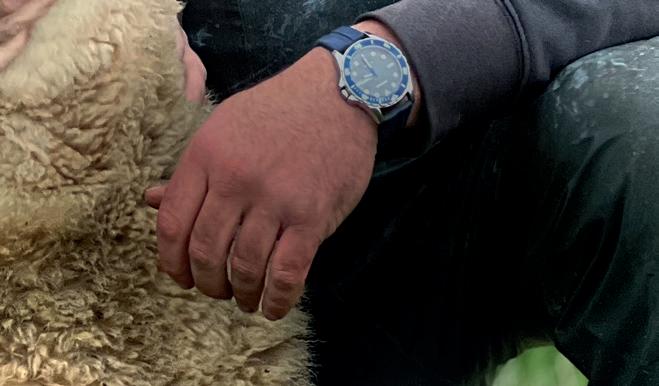











NFU Scotland, Rural Centre, West Mains Ingliston, Edinburgh EH28 8LT
NFU Scotland, Rural Centre, West Mains Ingliston, Edinburgh EH28 8LT

0131 472 4000
Tel: 0131 472 4000


OW often do you see or learn about something and think ‘I’m up for that’, but then never actually
www.nfus.org.uk nfuscotland @NFUStweets

www.nfus.org.uk nfuscotland @NFUStweets @nfuscotland
Editor Diana McGowan editor@nfus.org.uk
Design & Production
Editor Diana McGowan editor@nfus.org.uk
Mark Shreeve mark.shreeve@micropress.co.uk
Managing Editor
Hsilent commitment? Possibly too often or not at all.
Andrew Hirst andrew.hirst@micropress.co.uk
Craig Gibson
Advertising Sales
Design & Production
Ryan Swinney
Danny Lewis 01502 725862 danny.lewis@micropress.co.uk
Advertising Sales
Lawrence Kenny 01502 725860 lawrence.kenny@micropress.co.uk
Clare Stebbing clare@connect communications.co.uk
Tel: 0131 561 0024
Published on behalf of NFU Scotland by Connect Publications (Scotland) Ltd.
In this month’s magazine, our two features cover inspiring stories and highlight just how rewarding delivering on such thoughts can be both for the individual involved and others who may benefit along the way.

Diana McGowan
Studio 2001, Mile End, 12 Seedhill Road, Paisley PA1 1JS
Published on behalf of NFU Scotland by COUNTRYWIDE PUBLICATIONS
Fountain Way, Reydon Business Park, Reydon, Suffolk IP18 6SZ 01502 725800
Printed by MICROPRESS PRINTERS LTD
Fountain Way, Reydon Business Park, Reydon, Suffolk IP18 6SZ 01502 725800

We’re only a few weeks away from the Royal Highland Show. Over the course of four days, thousands will flock to the show to compete, judge, exhibit, organise, educate and socialise. We’ll see the best of the best and relish the atmosphere. Among the highlights and away from the main show ring, this year will see the welcome return of the Golden Shears Sheep Shearing and Woolhandling World Championships. Taking place at the MacRobert Theatre, the 2023 Worlds will see more than 30 countries compete for the prestigious title and it promises to be an action packed showcase of the art, skill and techniques required to be a world champion.
oesn’t everyone in farming watch the programme?” This was a question put back to me by Jo Morris from Newburgh, Fife. Jo and I were talking about the latest series (number seven) of the BBC’s This Farming Life programme, in which she, her husband Andrew and their children feature. Just in case you’re one of the few who haven’t watched it, the programme follows the lives of farming families across Scotland over the period of a year. Each featured family allow cameras onto their farms and into their lives, providing viewers with a valuable insight into what life on croft and farm is like. Life, at times, is tough – but never dull. The cameras are there to capture it all. It’s been great to watch over the years and many of our readers will know that some of the families featured have been/are NFU Scotland members.
With series seven drawing to a conclusion and series eight already being recorded, I took the opportunity to catch up with two of the families in series seven and those involved in producing it to see what’s involved and explain why taking part is so important. You can read my report on pages 28-32.
Perhaps a less well known event taking place at this year’s Highland is the final qualifying round of the 2023 Britain’s Fittest Farmer competition. Taking part in this event for the first time is Kyla Graham from Kirkcudbrightshire. Kyla first spotted the event at the Show last year and while watching it thought ‘I’m up for that’. Kyla knew however she couldn’t just enter there and then. Like any competition, she understood you need to be ready for it and without knowing if she would even enjoy it, she set her mind to it to finding out if she would. Kyla shares her journey from that moment to the present and highlights how she’s benefited already in so many ways both mentally and physically, and explains about the positive impact her preparation has had on her working life.
Show season is underway and I’m sure organisers and participants across the country have been working hard ahead of it. The Royal Northern Agricultural Society (RNAS) is getting set for BeefTech 25, which takes place at the end of May. Read more about that on pages 35-38. Anyone going will be in for a treat and do please visit the NFU Scotland stand.
The other feature looks at how a casual conversation during a Christmas lunch turned into the most rewarding and humbling experience for Next Generation Chair, Matthew Steel, one of the many volunteers who have recently delivered much needed 4x4 vehicles to Ukraine to support the war effort. Matthew explains his contribution to the ‘Pickups for Peace’ campaign and reflects on how the unexpected reception received from the Ukrainians has impacted him and those who were involved.
Having been lucky enough last year to win a Joe Watson Bursary award and take part in the International Federation of Agricultural Journalists Conference in Switzerland, I know exactly how benefi cial taking time away from the ‘day job’ do some additional training and knowledge exchange with peers within the sector is. That’s why I was delighted to hear about Lucy McGillivray’s successful recent venture to Brussels to take part in the EU Young Farmer Leadership Programme. On her return she mentioned farmers had been compared to ‘Swiss Knives’ and I instantly recalled my time in the alpine country. You can read more about Lucy’s rewarding experience on page 19. It’s also a timely reminder, that everyone should every now and then take a step out of ‘routine’ so that you can reset, refl ect on how you are doing things and chat amongst others who may help you solve a particular challenge, reaffi rm you’re doing things well or simply lighten the load.
Finally, as we head towards the longest day, with the hope of some warmer weather on the horizon, I hope you’re remembering to dress for the weather and wear protective sunscreen and hat when you’re out and about. The strength of the sun even on a dull day can prove harmful if exposed without protection. If you need a new baseball cap, visit the NFU Scotland website and purchase one from the branded merchandise in the Members’ Benefits section.
Elsewhere you can catch up on the latest news, updates from the regional, policy and political teams.
I hope you enjoy the read.
DIANA McGOWAN, Editor, Scottish Farming Leader Keep up to date with all the news on Facebook or follow us on Twitter @NFUStweets
For the weekly news sent to your email, please send your name and membership number to info@nfus.org.uk
“We’ll see the best of the best and relish the

Keep up to date with all the news on Facebook or follow us on @martinkennedyvp and @NFUStweets

For the weekly news sent to your email, please send your name and membership number to info@nfus.org.uk

Andrew Connon
Amild, dry winter and Spring have led to an early start on the land for most, with some farmers drilling fi ve weeks ahead of last year into perfect seed beds. Winter crops have come through well and show good potential. However, the fi nancials of combinable cropping continue to cause unease with subdued prices and increase of imported wheat being the main reasons. Conversations on provenance, quality, high assurance standards of Scottish Grain and the need for a premium price for a premium product in malting barley continue with Maltsters, Distillers, Merchants and the Scotch Whisky Association. The grand weather has also been a great boost for those busy with lambing and calving and hopefully
prices for stock remain buoyant. Dry spells however bring hazards, with wildfi res already reported and water scarcity being spoken about for the summer.
I’ve had considerable contact with members recently. The most common calls, often complete with photo and video evidence, are highlighting the horrendous slaughter or injury being infl icted on farm livestock. Be it ravens in Orkney, sea eagles in the West or badgers in Aberdeenshire, the issues are consistent: outof-control predator numbers creating havoc with livestock farming and nature. Add to this is the destruction of riverbanks by beavers, creating further fl ooding threats and destruction of crops on some of our best arable areas. It really is time for a reset here by
I’ve had considerable contact with members recently. The most common calls, often complete with photo and video evidence, are highlighting the horrendous slaughter or injury being inflicted on farm livestock.
Government, without delay. What is more important? Preserving predators or preserving the wellbeing and mental health of our farmers and crofters, the welfare of farm livestock and the fi nancial viability of their businesses?
It’s diffi cult to ignore what’s currently going on in the USA. With the potential of tariff s being spoken about daily, it’s an incredibly uncertain time for global economies. Added to tariff s, there’s talk of trade deals. NFU Scotland has consistently lobbied that any trade deal cannot undermine the high produce and animal welfare standards of UK farming. Our industry was left reeling after the Australian and New Zealand Free Trade Agreements, and there can be no repeat. We continue to pressure the UK Government on this.
The proposed interference with IHT/APR taxation continues to make big headlines and the threats to our industry of National Insurance hikes, loss of the full capital allowance on double cab pick-ups and the threats of a rise in fertiliser prices through the Carbon Border Adjustment Mechanism (CBAM) are huge. We’ve written to the Chancellor highlighting our concerns and the need for a rethink on all of these issues.
Show season is now upon us. I’m looking forward to meeting as many of you as possible in the months ahead at the various shows! In the meantime, I wish you all a good growing season!














































































































Preventative treatment of ewes and lambs is always the most cost-effective strategy against blowfly strike.1









































Weeks’ prevention 16 19 8




To find out more on preventing blowfly strike on farms visit: www.farmanimal.elanco.com/en_gb Scan the QR code below to sign up to Blowfly Watch for local alerts on



In recent tyre *testing the Ascenso XLR880 were proven to be more fuel efficient and offer better traction over a well known premium brand. *Data provided by Provana Group International from trials conducted in Oct - Nov 2022 The full report can be obtained by contacting your local Ascenso tyre dealer.



IDuncan Macalister Vice-President
’m writing this not long after returning from a three-day crofting road trip to the Western Isles. Over the packed threeday programme, I visited seven islands, met with around 75 crofters at three open member meetings, and toured two crofts. Our crofting members make up around ten percent of our overall membership, and are all very important to our core work. My trip was hugely insightful into the complexities of crofting law and daily activity. I’m taking all my newfound and refreshed knowledge back to the CHIC and LFA committees, Presidential team and staff. My ask of all our crofting members,

WRobert Neill Vice-President
hat a diff erence a year makes. Spring crops have all been sown into near perfect conditions - the old saying “a crop well sown is half grown”! The worry we all have though now that the crops have been sown, is whether there is a market for the produce at harvest time. With a downturn in whisky exports and the uncertainty on US tariff s, will the Scottish malting barley be wanted and at what price? Our input costs of growing the barley are certainly not reducing.
Livestock prices still remain high, in fact we have never seen prices rise as rapidly as this before which of course seems to be refl ecting
it to please feed into your local representatives. It is essential we have clear asks from you for our Committees to accurately address your needs and take forward these keys asks on your behalf.
Another big issue that continues to blight those farming, particularly on the west coast, is that of sea eagle predation. The Union has rightly welcomed the increase in funding from the Scottish Government to help support the management of this species. The impact of predation of domestic livestock by sea eagles is signifi cant, and the additional funding is a big win for the Union and our members. With the increase and spread in the birds’ population,

the funds will hopefully allow NatureScot to target mitigation in areas most seriously aff ected.
I’ve also been in Holyrood along with the rest of the Presidential team to
the reduction in livestock numbers in Scotland. In this area at least farmers are seeing a fairer return from the supply chain.
I recently represented NFU Scotland at the Ulster Farmers’ Union conference and round table, where there was a lot of discussion on Inheritance tax, national insurance, trade deals and animal diseases. We were all in agreement on biosecurity, especially around border controls and a joint statement was agreed upon and issued. It was great to hear from all our colleagues with the same worries as ourselves and to know that we are not alone. I look forward to working collaboratively with all of the farming unions on other
meet with the four main parties. Plus I’ve now had full briefi ngs from all the committees I’m overseeing in my VP position this year. So it’s been another busy month for sure.

common key issues.
Show season is almost here and I’m looking forward to travelling around the country to speak to as many members, and potential new
members, as possible. I have spent many hours in online meetings since taking on this role, but nothing beats getting out and speaking to people face-to-face.
The Agri-Environment Climate Scheme (AECS) remains open for applications until 12 June for agri-environment and for stand-alone organic conversion and maintenance applications until 31 July.
If you are applying for organic conversion and maintenance as part of a single application with agri-environment management, this must be submitted by the 12 June 2025 deadline.
Similarly, if you are applying for water-use efficiency irrigation lagoon capital items alongside other AECS management options, your application must be submitted in the main agri-environment application window closing on 12 June.
For more information visit the Scottish Government Rural Payments website.



Members across the country who have signed up for the fuel cards we are offering through our partnership with UK Fuels are already benefiting significantly at the fuel pumps.
Some of the benefits for NFU Scotland members using the fuel cards are:
• Fixed weekly commercial diesel price with annual average savings of pump price minus 15ppl.
• Unleaded will be charged at the pump price minus 1ppl.
• No contract, account charges or card charges.
• Access to over 7,200 fuel stations including Shell, ESSO, BP, Morrisons, Tesco, Sainsbury’s, Applegreen, Texaco, Moto and many more.
• Online account management using the Velocity app and website.
• Ability to plan journeys with E-route via smartphone or SatNav.
• Simple weekly invoicing paid via direct debit.
Using the UK Fuels card at the garage forecourts:
• Your fuel card is not contactless and, in most instances, does not swipe, you will have to present your card to the cashier at the point of payment.
• All fuel cards are not accepted at selfservice pumps.
• Each week, on a Monday morning, all card holders will be notified of the price you will pay at the pump.
Call UK Fuels on 01270 667 691, email: nfuscotland.partners@radius.com or visit www.ukfuels.co.uk/nfu-scotland to sign up for free or find out more information.
According to the recently published report of Scottish Government’s Farm Business Survey, average farm income has dropped to £35,500 - the lowest level since 2019/20. Particularly hard-hit are livestock producers, with lowland cattle and sheep farm incomes plummeting by 87% and 68% of these farms now loss-making. In addition, more than one third of cereal and milk producers recorded a loss.
The figures are deeply concerning. They indicate a dramatic 51% fall in average farm incomes in 2023/24 and reflect the deepening financial pressures facing Scotland’s food producers.
Commenting on the report, President Andrew Connon called for urgent,
joined-up action across governments and fairer returns through the entire supply chain and said, “This sharp decline isn’t just about economics – it’s about the viability of farming businesses and the communities they support. For many, farm support is the only thing keeping the gates open. Without it, vital parts of our food system and rural economy simply wouldn’t survive. In addition, it’s alarming but not surprising to see the financials of the cereals and milk sectors given the subdued prices for cereals, not helped by continued grain imports, and huge disparity with milk contracts”.
“Farmers and crofters are part of the solution to climate and biodiversity goals, but we need fairer and sustained returns through supply chains, and
a support framework that gives confidence to invest, produce food sustainably and plan for the future”.
Andrew also criticised recent UK Government proposals on inheritance tax, warning they would compound an already dire situation for family-run farms. “This should be a wake-up call to the UK Government. It must urgently reconsider proposals that could decimate generational family farms. These are not cash-rich businesses – they’re the backbone of food production and rural Scotland.”
NFU Scotland is urging the wider supply chain to play its part by delivering a fairer return to primary producers, many of whom face crippling cost pressures and reduced margins.

Vice-President Duncan Macalister seized the earliest opportunity he could to visit members in Skye and the Western Isles at the end of March. He was eager to hear fi rst-hand about the challenges, issues and opportunities facing those crofting and farming in these areas. Duncan, who farms in Kintyre, spent three-days on the road meeting with members in Skye, Benbecula and Stornoway.
A big thank you to those who helped with arrangements for the trip - Jake Sayles, NFU Mutual Group Secretary, Lochalsh, Skye and the Outer Hebrides, and the Skye, Loch Duich and Western Isles NFU Scotland Branches – and to all those who turned out for the meetings.

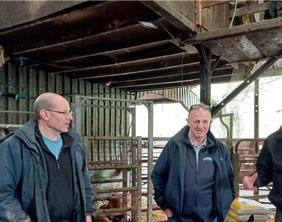




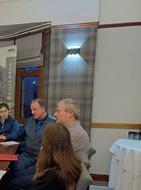









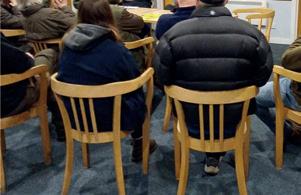


The Scottish Agriculture Awards, hosted in partnership by The Scottish Farmer, AgriScot and the Royal Highland & Agricultural Society of Scotland (RHASS), are back bigger and better for their third annual year. The awards aim to celebrate and showcase the best in Scottish agriculture, recognising excellence and innovation across a range of categories. This year the awards event will take place in the evening of Thursday 23 October.
Nominations are being sought across all award categories. Organisers are looking for the farmers, agricultural individuals, and


Anew Bill, set to ensure fairer prices for food producers, has been launched in Westminster by Alistair Carmichael MP, Chair of the Environment, Food and Rural Affairs Committee. The Bill promises to:
• Strengthen the Groceries Code Adjudicator in terms of remit and resources.
• Support greater public procurement of locally produced food.
• Enhance origin labelling requirements. Much of the detail that brings provisions for fairer prices for farmers and food producers reflects NFU Scotland’s key asks for agriculture in our 2024 General Election Manifesto, highlighting yet another instance of our influence in government.
Vice-President Robert Neill attended a meeting of the UK farming Unions in Northern Ireland ahead of the Ulster Farmer’s Union annual dinner recently. At the time there was mounting speculation of impending trade deals with the USA, which was part of discussions had between the four union representatives.
Issuing a joint news release at the end of their meeting, the four unions implored the government to stand up for UK agriculture in any trade negotiations with the US, saying, “It’s extremely concerning to see media reports that the UK government is trying to avoid US tariff s by seeking an urgent trade deal. While we do not want to see tariff s on UK agri-food going into the US, our second largest export market beyond the EU, it means our negotiators are on the back foot from the get-go and makes a balanced negotiation incredibly difficult.
“With the UK farming sector already under huge strain, with confi dence at an all-time low and investment dropping day by day, it cannot deal with another trade deal which sells out domestic food and farming.
“In the last couple of years, we’ve seen a much stronger performance by governments in safeguarding our most vulnerable sectors and seeking mutually benefi cial trade deals. This is this government’s fi rst test to see if
In a continuation of its Quarterly Success Reports, we’ve released a summary document containing last year’s highlights. The summary, available to read on nfus.org.uk, showcases what NFU Scotland’s staff, Board of Directors, stakeholders and members achieved in a calendar year, including infl uencing the Agriculture and Rural Communities (Scotland) Act, and the Fair Dealing Obligations (Milk) Regulations 2024. Promising for continued success in 2025, President Andrew Connon added: “On behalf of everyone at NFU Scotland, thank you for your ongoing support, expertise, and engagement. Our success is only possible because of you - our 9,000 dedicated members.”

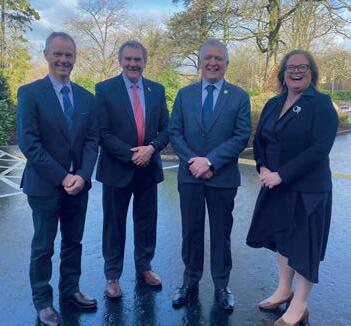
it will do what it promised and stand up for UK farming, or if it will roll over under pressure from an aggressive US administration.
“Absolutely no one wants to see hormone treated beef, or pork or chicken treated with anti-microbial washes –which are banned here in the UK – sold on our market. Those ways of production were banned in the 80s and 90s for a reason. They don’t reflect our values and the farm to fork approach we are proud of in the UK, something we know the British people care deeply about.
“Yes, the world is changing. But this is no time for a knee-jerk reaction. We urge the government to honour the commitments it has repeatedly made both to farmers and the public – that it will protect the safety, animal welfare and environmental standards which are at the heart of UK food, and not allow it to be undermined by shoddy trade deals.”

NFU Scotland held a member webinar on the Family Farm Tax in early April during which President Andrew Connon and Deputy CEO and Director of Policy Jonnie Hall set out the Union’s current work on the issue and discussed its next steps. Nearly 200 members tuned-in for the discussion and the panel answered questions from attendees. A recording of this session can be found on our website in the Budget information section accessed from the homepage.

Growing Tomorrow’s Leaders is back for its fourth year, supporting people across Scotland’s rural, agri, land and food sectors to lead with confidence, clarity, and impact. Developed by SAOS with NFU Mutual, NFU Scotland and Tack TMI Leadership Factory, the programme offers tools, peer support and coaching to help participants grow personally and professionally.




Applications are now open for the 2025/26 cohort. To find out more and apply visit the SAOS website (www.saos.coop).
Congratulations to the latest GTL graduates that included NFU Scotland’s Lorna Paterson, Lisa Hislop and Sarah Cowie, pictured here receiving their certificates.
Carly Ross, has joined NFU Scotland as the new Director of Communications. She will be leading the charge in how we tell Scotland’s farmers and crofters’ powerful story, their challenges, their achievements and their vital role in shaping a sustainable, resilient food system and rural
We want to make sure you are receiving important updates, news and event information from NFU Scotland. If you have recently changed your email address or are not receiving NFU Scotland communications via email, please get in touch to update your details.
Keeping your contact information up-to-date ensures that you don’t miss out on key industry news, policy updates, upcoming meetings, and exclusive member benefi ts. Whether it’s alerts on important agricultural developments or invitations to local events, we want to keep you informed and connected.

If you are a current member of Scottish Association of Young Farmers Clubs (SAYFC) you can join NFU Scotland today by becoming a NFU Scotland SAYFC member. You’ll have access to all the Union’s affinity membership benefi ts including UK Fuels fuel cards and vehicle deals, and you’ll also receive an electronic copy of Scottish Farming Leader every month. Additionally, you will have the opportunity to attend NFU Scotland events such as the AGM and on-farm networking events and qualify for members rates where applicable. You’ll receive access to all member communication materials and have the opportunity to shape and influence priorities through various networks such as branches, committees and monitors. Opt-in by visiting https://joinnfus.org.uk/sayfc-members/
economy. A key focus of her role will also be on enhancing the Union’s communication with you our members, ensuring timely, accessible and engaging content that address what you care about most.
Meanwhile, after 16 years heading up the Union’s Communications Team, Bob Carruth has become the Union’s
Dairy Policy Manager and will also be managing the Scottish Dairy Hub. The son of a dairy farmer, this role is not new to Bob, who has been an integral staff member for NFU Scotland for over 25 years - he previously held the role prior to entering communications in 2008. We wish both Carly and Bob well in their new positions.


















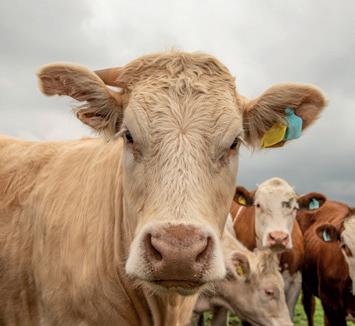
Scottish farmers and crofters started to receive valuable payments as part of the Scottish Suckler Beef Support Scheme (SSBSS) on Friday 28 March. Individual payment rates for 2024 are £111.33 for Mainland, and £155.03 for Islands.
The Scottish beef industry, with an estimated output of £849 million (QMS Red Meat Profile, 2024) is a vital cornerstone of our rural economy. The SSBSS, worth £40 million, is crucial to Scotland’s iconic beef sector. It supports farmers and crofters breeding beef calves from suckler cows and underpins Scotland’s commercial beef industry. From the overall SSBSS funding, £34 million is for eligible mainland calves and £6 million for Island calf claims.
2024 claims are the fi nal claims to be delivered before calving interval conditionality is applied to the SSBSS. This year’s fi gures highlight the persistent decline in our beef herd, worryingly the total of 347,546 calves claimed across both mainland and island (309,317 and 38,229 respectively), this is almost 19,000 less calves than in 2023, representing a six percent drop on the Mainland and two percent drop on Island calves. This is underlined by 313 less businesses claiming this year vs 2023 scheme year.
Read more reaction online at nfus.org.uk - news release no 38.










Jenny Brunton Senior European Policy Adviser

On Friday 14 March 2025, Member States’ representatives endorsed the Council’s negotiating mandate on the regulation on plants obtained by new genomic techniques (NGTs) and their food and feed.
The Council negotiating mandate includes changes to the Commission’s proposal including:
• opt-out from cultivation: member states can decide to prohibit the cultivation of category 2 NGT plants on their territory
• optional coexistence measures: member states can take measures to avoid the unintended presence of category 2 NGT plants in other products and will need to take measures to prevent cross-border contamination
• the Council’s position also clarifies that, in order to avoid the unintended presence of category 1 NGT plants in organic farming on their territories, member states can adopt measures, in particular in areas with specific geographical conditions, such as certain Mediterranean island countries and insular regions
The European Parliament adopted its negotiating position on NGTs in February 2024, before the June 2024 European Elections. MEPs want to keep mandatory labelling of products from both NGT 1 and NGT 2 plants and also agree that all NGT plants should remain prohibited in organic production.
Under the EU-UK TCA, Northern Ireland continues to follow EU regulations on plant health and safety, including the use of NGTs. The BAB team continues
to work alongside UFU to ensure the implications for farmers in Northern Ireland are recognised withing this dossier. With the Precision Breeding Bill in England there are signifi cant implications for UK internal market divergence as existing 2001 GMO legislation continues to apply in Scotland & Wales.*
Next steps:
The agreement on the Council’s negotiating mandate allows its presidency to start trilogue negotiations with the European Parliament on the final text of the regulation. We expect challenging discussions as MEPs will push back on patents, as well as labelling and safety assessments. The talks will be led on Parliament’s side by Swedish MEP Jessica Polfjärd from the centerright European People’s Party (EPP), a group broadly supportive of biotech innovation. The final outcome will need to be formally adopted by the Council and the Parliament before the regulation can enter into force.
GE is done by a group of technologies that make the changes within the organism’s own DNA by moving, adding or deleting precise pieces of genetic material. Scientists argue that such changes are what happens in conventional breeding and can also come from induced mutations, as seen in the malting barley variety Golden Promise. In contrast to this, GM technologies involve inserting new, external DNA into an organism’s genome to introduce desired characteristics into plants or animals.
*The Scottish Government has begun a dialogue looking into the feasibility of enacting legislation in Scotland which allow for gene editing in plants. The UK Parliament have already passed both the primary and secondary legislation of the Genetic Technology (Precision Breeding) Bill, which leads to question marks about Scottish growers being left behind and also what happens with cross border (into Scotland) trade of GE crops. NFUS continues to lobby the Scottish Government to review its stance in the face of scientific research and make provision for Scottish growers to access this essential tool. NFUS also continue to highlight the border implications between Scotland and England, now that the legislation is fully implemented down south.


Learn how to make your money work best for you with advice from NFU Mutual on investing wisely and understanding your allowances
hile many people look forward to traditional festive fare at this time of year, others are unable to afford even the most basic food for themselves, and their families.
hile many people look forward to traditional festive fare at this time of year, others are unable to afford even the most basic food for themselves, and their families.
Khile many people look forward to traditional festive fare at this time of year, others are unable to afford even the most basic food for themselves, and their families.
OThe agricultural sector is undergoing a remarkable transformation, with technological advancements reshaping traditional farming practices. From precision agriculture to automation, these innovations offer farmers opportunities to enhance efficiency, productivity, and sustainability. As these technologies become integral to modern farming, ensuring their protection and optimal use is paramount.
The cost-of-living crisis – and rising cost of even basic foods – has made it even more difficult for many people to put a meal on the table this year. In fact, more than 13 million people in the UK face food insecurity, according to FareShare, the UK’s biggest charity fighting hunger and food waste.
ver the past three decades, Agri-Tech has evolved significantly.
The cost-of-living crisis – and rising cost of even basic foods – has made it even more difficult for many people to put a meal on the table this year. In fact, more than 13 million people in the UK face food insecurity, according to FareShare, the UK’s biggest charity fighting hunger and food waste.
eeping all of your money in cash savings accounts may seem like a safe option. But you may miss out on the potential to grow your money, particularly if interest rates don’t keep up with inflation. Now could be a good time to reconsider how and where to keep your money, and understanding your allowances can be helpful.
Advancements in precision agriculture, automation, and data analytics have empowered farmers to optimise operations, reduce waste, and increase yields. However, this rapid technological progression also introduces challenges, including the need for continuous learning, potential cybersecurity threats, and reliance on technology that may become obsolete.
practical advantages and limitations. Once you’ve made the leap, it’s important to invest in training, ensuring all employees are adequately trained for seamless technology integration.
Safeguarding new technologies involves several critical steps:
At the same time, every year, more than three million tonnes of good-to-eat, surplus food goes to waste on UK farms. That’s enough for seven billion meals, according to FareShare, which takes good-to-eat surplus food from across the food industry, sorts it and passes it onto a network of nearly 8,500 charities and community groups across the UK.
The current tax year ends on 5 April 2024. Here are some things for you to consider:
Farmers are increasingly integrating advanced technologies into their operations, artificial-intelligence driven analytics, robotic milking parlours and automated feeding systems to name a few examples.
WAt the same time, every year, more than three million tonnes of good-to-eat, surplus food goes to waste on UK farms. That’s enough for seven billion meals, according to FareShare, which takes good-to-eat surplus food from across the food industry, sorts it and passes it onto a network of nearly 8,500 charities and community groups across the UK.
The adoption of these technologies offers numerous advantages:
• Increased Efficiency: Automation reduces manual labour, allowing farmers to focus on strategic tasks.
Talk to an NFU Mutual Financial Adviser. Together we’ll review your financial situation and help you to understand your options.
• Regular Inspections: Ensure all electrical installations undergo routine inspections by qualified electricians to prevent faults.

2025 according to Defra. Equipment and Technology Grants will soon be available for equipment, technology, and innovation, aiming to support farmers in enhancing productivity and sustainability. These funding initiatives present valuable opportunities for farmers to integrate cutting-edge technologies into their operations, fostering a more efficient and resilient agricultural sector.
To learn more about NFU Mutual and our community support initiatives, visit www. nfumutual.co.uk/ fightfoodpoverty/or scan the below QR code with a smart phone
To learn more about NFU Mutual and our community support initiatives, visit www. nfumutual.co.uk/ fightfoodpoverty/or scan the below QR code with a smart phone
ith climate change driving hotter and more extreme weather, it’s no wonder that research conducted by NFU Mutual shows that heat stress in cattle is becoming a bigger consideration for farmers.
In 2022-2023, the charity redistributed 54,000 tonnes of food: enough to make 128m meals, or four meals every second. At NFU Mutual, we see it as part of our role to make positive impacts on the welfare of those working and living in rural communities in the UK, and we are only too aware of the growing impact of food poverty in rural communities.
• Adherence to Maintenance Protocols: Follow manufacturers’ guidelines for servicing equipment, and train staff to handle potential issues.
But what is heat stress and why is it a problem?
Putting money into a pension is one of the most tax-efficient ways to invest for the long term. The government helps you invest – for every £80 you pay into your pension, HMRC currently pays an extra £20 tax relief making your actual contribution worth £100. In a pension, any growth is free from UK Income Tax and Capital Gains Tax. There are however rules on the amount you can contribute to your pension each year and still receive tax relief.
In 2022-2023, the charity redistributed 54,000 tonnes of food: enough to make 128m meals, or four meals every second. At NFU Mutual, we see it as part of our role to make positive impacts on the welfare of those working and living in rural communities in the UK, and we are only too aware of the growing impact of food poverty in rural communities.
• Enhanced Resource Management: Precise monitoring leads to better utilisation of resources such as water, fertilisers, and pesticides.
• Improved Yields: Data-driven decisions contribute to healthier crops and higher productivity.
• Reduced milk yields from cows.
As farmers know all too well, this surplus food will often end up getting ploughed back into the ground, used for animal feed or sent to landfill.
You can invest up to £2,880 per child each tax year into a pension and HMRC will top this up with a further £720 to give a total of £3,600. This is a long-term investment, designed to give children a head start.
As farmers know all too well, this surplus food will often end up getting ploughed back into the ground, used for animal feed or sent to landfill.
As farmers know all too well, this surplus food will often end up getting ploughed back into the ground, used for animal feed or sent to landfill.
• Reduced farm income, putting pressure on fine margins and profitability.
• Manual Process Contingencies: Develop plans to revert to manual operations during power outages or equipment failures.
Build an ISA nest egg
• Prompt Response to Alerts: Act immediately on automated warning messages to prevent losses or damages.
But the Surplus with Purpose scheme avoids thousands of tonnes of surplus fresh fruit and vegetables, meat and dairy products being wasted. Even cupboard items, and chilled and frozen foods, find a new home as part of the scheme.
But the Surplus with Purpose scheme avoids thousands of tonnes of surplus fresh fruit and vegetables, meat and dairy products being wasted. Even cupboard items, and chilled and frozen foods, find a new home as part of the scheme.
But the Surplus with Purpose scheme avoids thousands of tonnes of surplus fresh fruit and vegetables, meat and dairy products being wasted. Even cupboard items, and chilled and frozen foods, find a new home as part of the scheme.
• Health-related issues such as increased risk of disease, lameness and reduced fertility. There is also evidence to suggest that it affects the unborn calf and their subsequent performance.
She adds:
Capital Gains Tax
To learn more about NFU Mutual and our community support initiatives, visit www. nfumutual.co.uk/ fightfoodpoverty/or scan the below QR code with a smart phone
when you make the gift. Inheritance tax planning is not regulated by the Financial Conduct Authority.
Heat stress can have a major impact on farm businesses but you can protect dairy cattle.
• Provide suitable access to water troughs, ensuring they are in good working order.
Embracing Agri-Tech is pivotal for the future of farming, offering pathways to increased efficiency, sustainability, and profi tability. However, with these advancements come new responsibilities to protect and maintain technological investments. By staying informed about emerging technologies, implementing robust protection strategies, and leveraging available funding opportunities, farmers can navigate this evolving landscape with confidence and success. NFU Mutual Agents can help with this journey.
This is why our NFU Mutual Charitable Trust – which exists to promote and support charities working in agriculture, rural development and insurance – is proud to support FareShare’s fight against food poverty. Since 2021, the NFU Mutual Charitable Trust has donated a total of £250,000 to the charity.
Heat stress occurs when cows retain more heat than they can release, affecting both indoor and outdoor herds.
The cost-of-living crisis – and rising cost of even basic foods – has made it even more difficult for many people to a meal on the table this year. In fact, more than 13 million people in the UK face food insecurity, according to FareShare, the UK’s biggest charity fighting hunger and food waste. same time, every year, more than three million tonnes of good-to-eat, surplus food goes to waste on UK farms. That’s enough for seven billion meals, according to FareShare, which takes good-to-eat surplus food from across the food industry, sorts it and passes it onto a network of nearly 8,500 charities and community groups across the UK. 2022-2023, the charity redistributed 54,000 tonnes of food: enough to make 128m meals, or four meals every second. At NFU Mutual, we see it as part of our role to make positive impacts on the welfare of those working and living in rural communities in the UK, and we are only too aware of the growing impact of food poverty in rural communities. is why our NFU Mutual Charitable Trust – which exists to promote and support charities working in agriculture, rural development and insurance – is proud to support FareShare’s fight against food poverty. Since 2021, the NFU Mutual Charitable Trust has donated a total of £250,000 to the charity.
This is why our NFU Mutual Charitable Trust – which exists to promote and support charities working in agriculture, rural development and insurance – is proud to support FareShare’s fight against food poverty. Since 2021, the NFU Mutual Charitable Trust has donated a total of £250,000 to the charity.
For instance, robotic milking parlours enable cows to be milked at optimal times, improving milk yield and quality while freeing up farmers to attend to other essential tasks.
The cause is due to a rise in environmental temperatures and humidity and an increase in the cow’s heat production associated with increasing milk yields. To monitor heat stress levels, the industry uses the Temperature Humidity Index (THI) which indicates how severe the condition could be and suggests that action needs to be taken.
• Enhance Security Measures: Implement robust physical security to protect theft-attractive items like GPS trackers, and consider removing such equipment from vehicles overnight when safe to do so.
You can invest up to £20,000 this tax year in an ISA, building up a nest egg free of UK Income tax and Capital Gains tax. The same tax benefits are available with Junior ISAs, which you can use to build up a pot of money for a child – they’ll be able to access that when they’re 18 years old. The maximum Junior ISA contribution is £9,000 in the 2023/4 tax year.
Furthermore, farmers tell us they’re not always aware of the extent of the financial losses they’re suffering from heat stress in cattle.
Putting money aside for children can also help reduce your potential Inheritance Tax bill.
One grower making the most of the opportunity presented by the scheme is Southern England Farms, based in Hayle, West Cornwall. The business works over 6,500 acres and is a key supplier to several major UK retailers, including a number of supermarkets, of Cornish-grown courgettes, cauliflower, broccoli, spring greens, sweetheart and savoy cabbage.
One grower making the most of the opportunity presented by the scheme is Southern England Farms, based in Hayle, West Cornwall. The business works over 6,500 acres and is a key supplier to several major UK retailers, including a number of supermarkets, of Cornish-grown courgettes, cauliflower, broccoli, spring greens, sweetheart and savoy cabbage.
• Address Health and Safety Considerations: Recognise that new technologies may introduce new health and safety considerations, necessitating updated training and revised safety procedures.

Things you should know:
How farms are donating their surplus for good Farms and rural businesses throughout the UK are also doing their bit to help. They can participate through FareShare’s Surplus with Purpose scheme, which helps businesses to cover the extra costs of redistributing their unsold food to people who need it most.
How farms are donating their surplus for good Farms and rural businesses throughout the UK are also doing their bit to help. They can participate through FareShare’s Surplus with Purpose scheme, which helps businesses to cover the extra costs of redistributing their unsold food to people who need it most.
How farms are donating their surplus for good Farms and rural businesses throughout the are also doing their bit to help. They can participate through FareShare’s Surplus with Purpose scheme, which helps businesses to cover the extra costs of redistributing their unsold food to people who need it most.
Before investing in new technologies, farmers should conduct thorough research, evaluating the reliability and reputation of technology providers. It’s important to assess the costs and benefits, making sure to fully understand the total cost of ownership and potential returns on investment. It’s worth visiting other farms, and shows and events, to see the technology in action to appreciate its
Once you reach 55 (57 from 2028), you can take money from your pension as you wish. The first 25% will normally be tax-free, any amount over and above is added to your other income and taxed. So withdrawing lump sums from your pension could push you into a higher Income Tax bracket. Spreading withdrawals over a number of tax years could help reduce the impact of any tax liabilities. There’s also a limit on the annual pension contributions you and your employer can make if you’ve already taken a taxable withdrawal from your pension. This could mean you miss out on valuable employer pension contributions in addition to your own.
In recent years industry studies have highlighted the condition and the impact it can have on farm businesses. It’s generally acknowledged that heat stress can result in:
Our latest research has found that just over four in ten (41%) say that heat stress is a priority risk for their business while 70% are yet to take further steps to reduce the risk. *
Don’t forget Inheritance Tax planning It’s wise to take a long-term view on inheritance planning, so that your heirs don’t pay more tax than they need to.
One grower making the most of the opportunity presented by the scheme is Southern England Farms, based in Hayle, West Cornwall. The business works over 6,500 acres and is a key supplier to several major UK retailers, including a number of supermarkets, of Cornish-grown courgettes, cauliflower, broccoli, spring greens, sweetheart and savoy cabbage. Co-owner Jane Richards, along with her 400-plus pickers, works with FareShare to ensure any excess vegetables never go to waste. Since 2019, they have donated 396 tonnes of excess produce to the charity.
Co-owner Jane Richards, along with her 400-plus pickers, works with FareShare to ensure any excess vegetables never go to waste. Since 2019, they have donated 396 tonnes of excess produce to the charity.
Co-owner Jane Richards, along with her 400-plus pickers, works with FareShare to ensure any excess vegetables never go to waste. Since 2019, they have donated 396 tonnes of excess produce to the charity.
Should you suspect heat stress with your dairy cattle this summer, Dr Tom Chamberlain** highlights some of the key actions that you can undertake to reduce heat stress whilst cows are grazing:
Jane says: “No farmer ever wants to see their produce go to waste. But sometimes circumstances mean there is a surplus that will often go into the waste trailer or simply become compost.”
One way of doing this is to make gifts to your loved ones, taking advantage of the annual £3,000 gift allowance, or the ‘gifts out of normal expenditure’ exemption. Larger gifts can also be exempt from Inheritance Tax as long as you live more than seven years from
To support the adoption of innovative technologies, new funding opportunities are on the horizon. The Accelerating Development of Practices and Technologies (ADOPT) Fund, part of Defra’s Farming Innovation Programme, will provide farmer-led, smaller-scale innovation grants for trialling new technologies and methods on farms. The ADOPT Fund is due to launch in Spring
Jane says: “No farmer ever wants to see their produce go to waste. But sometimes circumstances mean there is a surplus that will often go into the waste trailer or simply become compost.”
Jane says: “No farmer ever wants to see their produce go to waste. But sometimes circumstances mean there is a surplus that will often go into the waste trailer or simply become compost.”
• When buffer feeding adding suitable feed additives to maintain rumen health and ensure peak nutrition.
Those selling or gifting shares, or property other than their main home, will see the amount of tax-free gain they can enjoy fall from £6,000 to £3,000 from April 2024.
• The tax benefits of pensions and ISAs depends on individual circumstances and may change in the future.
For personalised advice on adopting and safeguarding new technologies visit NFU Mutual’s Agri-Tech hub by scanning the QR code or visiting nfumutual.co.uk/agri-tech-report
“The scheme with FareShare is a brilliant way of ensuring excess produce is redistributed to those who really need it. It is so very rewarding when we find out how many meals our surplus veg has gone on to make. It is great that NFU Mutual has embraced the scheme so wholeheartedly and supports their customers who wish to participate in ‘Surplus with Purpose’ too.”
She adds: “The scheme with FareShare is a brilliant way of ensuring excess produce is redistributed to those who really need it. It is so very rewarding when we find out how many meals our surplus veg has gone on to make. It is great that NFU Mutual has embraced the scheme so wholeheartedly and supports their customers who wish to participate in ‘Surplus with Purpose’ too.”
She adds: “The scheme with FareShare is a brilliant way of ensuring excess produce is redistributed to those who really need it. It is so very rewarding when we find out how many meals our surplus veg has gone on to make. It is great that NFU Mutual has embraced the scheme so wholeheartedly and supports their customers who wish to participate in ‘Surplus with Purpose’ too.”
• The value of your pension and investment funds can go down and you may get back less than
• Implementing ‘Siesta’ Management where appropriate – this technique involves cows grazing directly after milking and then being ‘housed’ at around 10am, with buffer feed available to them. Cows are then sent back out to graze after afternoon milking to graze until dusk.
• Adjusting milking times to coincide with the cooler periods of the day.
• Installing shade and fans in holding
We at NFU Mutual applaud Jane and all the team at Southern England Farms for their outstanding efforts in supporting the work FareShare does to alleviate food poverty in our communities.
We at NFU Mutual applaud Jane and all the team at Southern England Farms for their outstanding efforts in supporting the work FareShare does to alleviate food poverty in our communities.
We at NFU Mutual applaud Jane and all the team at Southern England Farms for their outstanding efforts in supporting the work FareShare does to alleviate food poverty in our communities.
We’re proud to support FareShare –and we praise all farms and rural businesses who participate in the Surplus with Purpose scheme.

We’re proud to support FareShare –and we praise all farms and rural businesses who participate in the Surplus with Purpose scheme.
We’re proud to support FareShare –and we praise all farms and rural businesses who participate in the Surplus with Purpose scheme.
• Implementing a tree planting programme at the boundaries of grazing paddocks to provide suitable levels of shade within the grazing

For more information about FareShare’s Surplus with Purpose scheme, and how you can participate, visit www. fareshare.org
For more information about FareShare’s Surplus with Purpose scheme, and how you can participate, visit www. fareshare.org
For more information about FareShare’s Surplus with Purpose scheme, and how you can participate, visit www. fareshare.org

To find out more about NFU Mutual insurance or financial services, speak to your local NFU Mutual agency office or visit nfumutual.co.uk/tax-allowances NFU Mutual Financial Advisers advise on NFU Mutual products and selected products from specialist providers. When you get in touch, they’ll explain the advice service and charges.



Beatrice Morrice Head of External A airs



Jonnie Hall, NFU Scotland Deputy CEO and Director of Policy gave evidence to the Scottish Parliament’s Rural Aff airs and Islands Committee last month. During the session, which considered agricultural climate transition, he highlighted that the sector is committed to delivering high-quality food production, climate and nature restoration, and supporting prosperous rural economies. He also discussed future agriculture policy changes and underlined opportunities for the decarbonisation of farm machinery.

The Land Reform (Scotland) Bill completed Stage 1 at the Scottish Parliament with 91 MSPs voting in favour of the legislation. Edward Mountain MSP, Convener of the Scottish Parliament’s Net Zero, Energy and Transport Committee attended an online meeting with our Legal and Technical Committee at which they discussed his committee’s report on the Bill. NFU Scotland issued a briefing to MSPs in advance of the parliament debate that highlighted concerns our members have about unintended consequences from elements of the Bill and called for changes to be made. We also underlined to MSPs that NFU Scotland supports responsible land ownership and management and that farmers and crofters are vital to local communities and the socio-economic fabric of Scotland. Stage 2 is expected to commence after Easter recess.


Andrew Connon, President and Vice-Presidents
Duncan Macalister and Robert Neill, Jonnie Hall and Beatrice Morrice were at the Scottish Parliament in March for a number of political meetings. They met with the Cabinet Secretary for Rural Affairs, Land Reform and Islands Mairi Gougeon MSP and Minister for Agriculture and Connectivity Jim Fairlie MSP, Anas Sarwar MSP Scottish Labour Leader, Russell Findlay MSP Scottish Conservative Leader, Alex Cole Hamilton MSP Scottish Liberal Democrat Leader, Rhoda Grant MSP, Tim Eagle MSP, Willie Rennie and Finlay Carson MSP.
We discussed many key issues facing the farming sector and underlined the need for an increased and multiannual funding commitment in the Scottish Budget going forward.

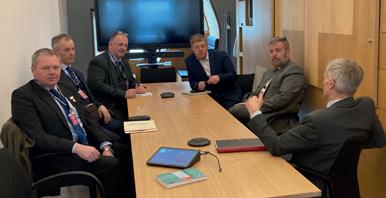


NFU Scotland’s member webinar, held 2 April, set o ut the work we have done on the changes to inheritance tax for farmers and our next steps in relation to future engagement. There have been multiple local farm visits with Scottish MPs across the regions, including several Labour MPs, and as well as underlining the impact the changes will have on family farms, we also continue to highlight the fact that investment is stalling in the sector currently. Given that the UK Government’s aim is economy growth, it is imperative that they meet with us and the other unions to discuss an alternative approach that will generate the required income for Treasury and not impact the viability of family farms.
The Natural Environment (Scotland) Bill was recently introduced to Scottish Parliament. This Bill aims to restore the natural environment and enhance biodiversity, activities our farmers and crofters already do while supporting rural communities and producing highquality food. The Bill is split into 4-parts. Part 1 introduces targets to improve biodiversity, Part 2 sets forth Environmental Impact Assessments regulations, Part 3 updates aims of National Parks, and Part 4 relates to management of wild deer. We will continue to monitor and work on this Bill as it is scrutinised by Rural Affairs and Islands committee. We will be submitting written evidence before the 9 May deadline.


Sarah Cowie Senior Policy Manager

Following the passing of the Wildlife Management and Muirburn (Scotland) Act 2024, you will now require a licence to carry out muirburn this season. Failure to have a licence in place will constitute an off ence. Licences can only be granted on the basis that muirburn meets one or more of the licensable purposes as set out in the Act. As a result of the Act, the Muirburn Code was required to be updated. NFU Scotland has been heavily involved in these discussions through the Muirburn Code Working Group. NatureScot has recently consulted on its draft guidance of the revised Muirburn Code.




LLisa Hislop Policy Manager
ast year, we introduced a new look ShelfWatch to shine a light on support for Scottish produce in the big eight retailers. The research consisted of four separate phases which visited almost 300 stores across Scotland looking at product origins across beef, lamb, chicken, pork, eggs, soft fruit, vegetables and dairy. The results from each phase and the year in review can be found on our website.
One of the main changes as a result of the Act is that as part of a muirburn licence, anyone making muirburn must have completed an approved training course. For this season only, the training will be available online. We encourage our members to undertake the training course this year to ensure they are covered. At the time of writing, we are seeking clarity on who exactly needs to be trained, as the legislation is not clear. We hope to update members on this as soon as possible.
The other major change is identifying areas of peatland and non-peatland. This is fundamental to applying for a muirburn licence because the licensable purposes
are determined by whether an area is or is not peatland. There are three steps to measuring the thickness of peat:
Step 1: Use the Muirburn Peatland Map to check if the area you wish to licence is likely to be peatland or not.
Step 2: To be licenced for a nonpeatland purpose, you must carry out two types of survey:
o A walkover of non-peatland areas.
o A full survey of uncertain areas (at 100m intervals).
Step 3: Use this information to identify where you want to burn and for what purpose, remembering that there are diff erent licensable purposes depending on whether the area is peatland or nonpeatland. If it is peatland, alternative methods must be considered.
Full information is available on the NatureScot website, and we encourage any members to get in touch with their questions or concerns.
While there is a wide range in support for Scottish produce and/or British produce across each retailer and commodity, it’s important to note that there are a number of contributing factors and challenges. As part of our refl ection on the year, we have fi ve key asks for all the retailers around increasing Scottish sourcing, championing, labelling, branding, and fairness through the supply chain to refl ect cost of production and ensure a sustainable future for Scottish Agriculture.
We recognise that achieving these asks will require collaboration across the whole supply chain, however it’s an opportunity that cannot be missed.
We are committed to repeating ShelfWatch for another consecutive year to build on the data we gathered throughout the 24/25 period. It continues to be an invaluable tool to engage with our retailers while also giving insight into how the supply chain is working. It also continues to be an important part of our wider supply chain workstreams.




RLucy McGillivray Policy Manager
ecently, young farmers from across Europe gathered in Brussels for the EU Young Farmer Leadership Programme, hosted by the European Council of Young Farmers (CEJA). The event focused on ‘Future-proof strategies for generational renewal’ and aimed to cultivate future leaders in agriculture. I was one privileged to be one of the programme delegates.


The programme began with a welcome from Marion Picot, CEJA’s Secretary General, followed by an inspiring address from Catherine Geslain-Lanéelle, Director of Policy Analysis and Perspectives. Catherine emphasised the importance of harnessing young farmers’ talents to become leaders in the sector.


Participants then engaged in various activities, including icebreakers and training sessions. Hans Van de Water from ‘The Floor is Yours’ led a session on delivering engaging presentations, where delegates pitched ideas on the future of agriculture in their home countries. Advocacy training by Andrea Boccuni from ‘The Good Lobby’ highlighted the importance of creating eff ective lobby strategies.
Communication strategy was a key focus, with the EU CAP Network team stressing the need for clear, accessible communication through videos and audio. Delegates also worked on case studies, analysing problems and solutions for fi ctional young farmers’ associations.
On the fi nal day, discussions centred on fi nancing young farmers’ organisations through public and private instruments. Marion Picot shared CEJA’s advocacy strategy for generational renewal, urging delegates to hold politicians accountable for supporting the next generation.
Elli Tsiforou, Secretary General for Copa-Cogeca, delivered an inspiring speech on the multifaceted skills required by farmers. Catherine GeslainLanéelle closed the programme, encouraging young farmers to dream big and advocate for food security.
The event concluded with delegates feeling inspired and ‘ready to fi ght’ for a thriving agricultural sector.
You can read more about the programme and learn why farmers could be considered as ‘Swiss knives’ in a blog I wrote about my experience and is available in full on our website –nfus.org.uk .




Penny Middleton Policy Manager
NFU Scotland welcomed the announcement from Scottish Government in March, that following extensive lobbying from NFU Scotland, livestock farmers and crofters impacted by sea eagle predation will benefi t from further support from the Sea Eagle Management Scheme (SEMS). The uplift to the funding for the SEMS to help with the management will also be supported by trials of new methods of prevention of livestock loss.
The Scottish Government announced




Rhianna Montgomery Policy Manager

Tthey will provide NatureScot with an additional £534,000 taking the total for the 2025-26 Sea Eagle Management Scheme to £970,000, intending to increase support for those worst impacted. Along with the budget increase they announced an increase in the cap on payments for maximum standard measures, from £1,500 to £1,800. The cap for the contribution to enhanced measures payment was doubled from £5,000 to £10,000 which will help increase the time spent by shepherds in the lambing parks during the period of
he Crofting Highlands and Island Committee met in early April at the first in-person meeting in a few years.
The meeting was held at SRUC’s Rural and Veterinary Innovation Centre (RAVIC), Inverness where members had a tour of the facilities including labs and postmortem room. We also discussed new equipment for castration and tail docking, which members found useful.

lambing. The increase in the amount of funding available to any individual was an ask of NFU Scotland and will help those worst affected by sea eagles.
In addition to the increase in funding made available to the scheme, Scottish Government will also be providing additional support to be shared by farms most severely impacted. This support will help those farms develop more bespoke approaches to reduce the risk of predation.
Minister Fairlie has been gathering a clear understanding of the impacts of sea eagle predation on both farming businesses and the emotional toll on farmers. He recognises that a balanced approach is needed in instances where sea eagles, or any species, comes into confl ict with agricultural activity, especially sheep farming. He has taken the time to visit famers aff ected by sea eagles to understand their concerns fi rst-hand.
This is a welcome uplift for this year’s scheme, but we must continue to work with Scottish Government to fi nd new tools for tackling the problem and longer-term, multi-annual commitments to fund and support those farmers impacted by problem birds.

Following the tour, the committee set priorities for the year with a critical priority being development of crofting. This was seen as important for the success of crofting policy as well as supporting the committee by creating a workplan for the year. The importance of engaging with other committees was raised, we were grateful to be joined by Chair of LFA, Peter Kennedy and Vice-Chair, Finlay Macintyre as part of this joint working venture.
Further discussions focussed on Crofting Law Reform, key proposals including joint tenancies, assignation and standard securities. The committee are keen to see a Bill which delivers for crofters. We will continue working closely with the Bill team and other stakeholders to ensure this happens.
The next meeting of the Committee will be to discuss the draft Muirburn code in conjunction with the Environment and Land Use Committee.
We have now completed stage 1 of the Land Reform Bill. This has been a very busy time for staff and the Legal and Technical Committee, with lots of discussions around amendments and proposals within the Bill. We have been engaging with stakeholders and groups to ensure we are discussing the proposals from all angles.
As we prepare for stage 2 of the Bill to start, we are finalising our amendments, with a key focus on retaining the 3000ha threshold for land management plans, ensuring they are light touch and ensuring agricultural holdings proposals support a healthy and vibrant tenanted sector.
This continues to be a huge piece of work for our Legal and Technical committee who have highlighted land reform as a critical priority for 2025/26.


Bob Carruth Policy Manager

‘SEE
After three years of working at NFU Scotland, it’s time for me to turn the page to a new chapter. But before I do, I want to take a moment to refl ect on this journey and express my gratitude to the people who I have met along the way.
Coming from a dairy farm, I thought I had a good understanding of all things dairy, but the role of Dairy Policy Manager gives you a diff erent insight into a sector that probably has the most complex supply chain. Throw in the new Fair Dealings Obligations (Milk) Regulations (FDOM 24) it makes it even more complicated. Despite the complexities and joining at the eleventh hour on milk contracts, I feel privileged to have worked and been part of a dedicated milk committee in getting the milk regulations over the line. The implementation of the FDOM 24 represents a signifi cant step
forward in creating a fairer and more transparent dairy industry in the UK, although I do not think we will know how good it is until it is tested.
With Bruce Mackie continuing as Milk Chair for a third year and Colin Ferguson as Vice, I am confi dent that the newly appointed Dairy Policy Manager, Bob Carruth, will have them and the milk committee well supported and focused on delivery.
The future of Scottish Dairy farming is shaped by a mix of challenges and opportunities. Arla’s plans to invest £90 million in its Lockerbie facility were welcomed news. This signifi cant investment is a vote of confi dence in Scotland’s dairy sector.
So, on that positive note, I want to wish the Milk Committee and Bob all the best. Remember, this isn’t goodbye - it’s simply “see you later” and that may well be in Wetherspoons at the NFUS Conference!





Ian Davidson Scottish Land Matching Service
I’m writing this in early April and have been reflecting on what a difference a year makes. This time last year it seemed the cold wet weather was never ending and taking its toll on everything on the farm or croft - including the people. This year grain is sown, tattie planting is started, fertiliser is on, livestock prices continue to break records, and the current forecast for the next ten days suggests that lambing and calving should be a less challenging experience than last year.
I spoke recently to someone who was hinting that in some parts of the country a little bit of rain would not go amiss but I think in general better weather makes people feel a bit more positive. That is so important given all the pressure the extra workload brings at this time of year. And even if the pressure is getting too much make sure you speak to someone –sharing the burden and any worries can only be of help.
I participated in the Public Landowners conference at Ingliston on 25 March organised by the Farm Advisory Service in conjunction with the Farming Opportunities for New Entrants group. With 10 percent of land in Scotland under public ownership the event was an opportunity to engage decision makers in the various organisations responsible for managing that asset with a view to exploring how more opportunities for new entrants might be brought forward.
The conference heard from three young farmers telling their stories of how they had developed their opportunities to get that vital fi rst rung on the farming ladder. Each very diff erent in how things had come about but all very inspiring in their own right. Hard work, determination, fl exibility and willingness to take a chance when it arose were the things that stood out from their stories. I wish them every success going forward.





TJohn Flanagan Senior Policy Manager
he annual meeting was hosted by the IBH at the James Hutton Institute, Dundee recently. The meeting showcased research advancements and challenges in barley production across multiple domains. Climate challenges featured prominently, as well as the loss of biodiversity. Scientific updates covered several areas:
Advances from single-genome to pan-genome approaches which reveal dynamic genetic diversity among barley varieties, showing genotype responses to environmental challenges.
Research demonstrated how root architecture affects nutrient and water uptake, with certain genotypes better at accessing deeper resources and how barley could use specific soil microbiomes to enhance nutrient utilisation.
Integrated Pest Management was shown to be central to sustainable barley farming, with cover crops, minimum tillage, and grazing winter barley with sheep showing effectiveness without yield reduction.
Research examined how water scarcity impacts Scotland’s barley and whisky sectors, highlighting business engagement with nature for sustainability.
Advances in barley genome sequencing, reference transcript databases, and genotyping platforms were presented.
Research showed how barley can be optimised for brewing and distilling, addressing environmental impact, utilising biostimulants, and co-products.
AHDB presented data showing that Scotland produced its largest barley crop since 2020 (1.99 million tonnes), but declining alcohol demand and whisky exports signal a 9% decrease in UK barley area expected in 2025.
The workshops held during the meeting helped raise awareness and understanding of the challenges faced across the supply chain and identifi ed opportunities to improve the fl ow of knowledge and information for the industry.
From an NFU Scotland perspective, the day highlighted the diverse approaches being taken by the IBH to help take the Scottish cereal industry forward. The challenges seem enormous just now, but with the benefi ts of targeted research, farmers can access more tools to help drive the profi tability and build resilience within their businesses going forward. As with all new farming developments, farmer involvement is key to ensure the correct topics are being researched and we’re keen to engage to get the most out of this fantastic resource.


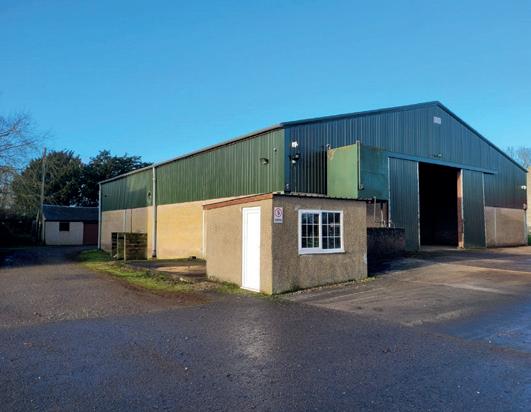










































































































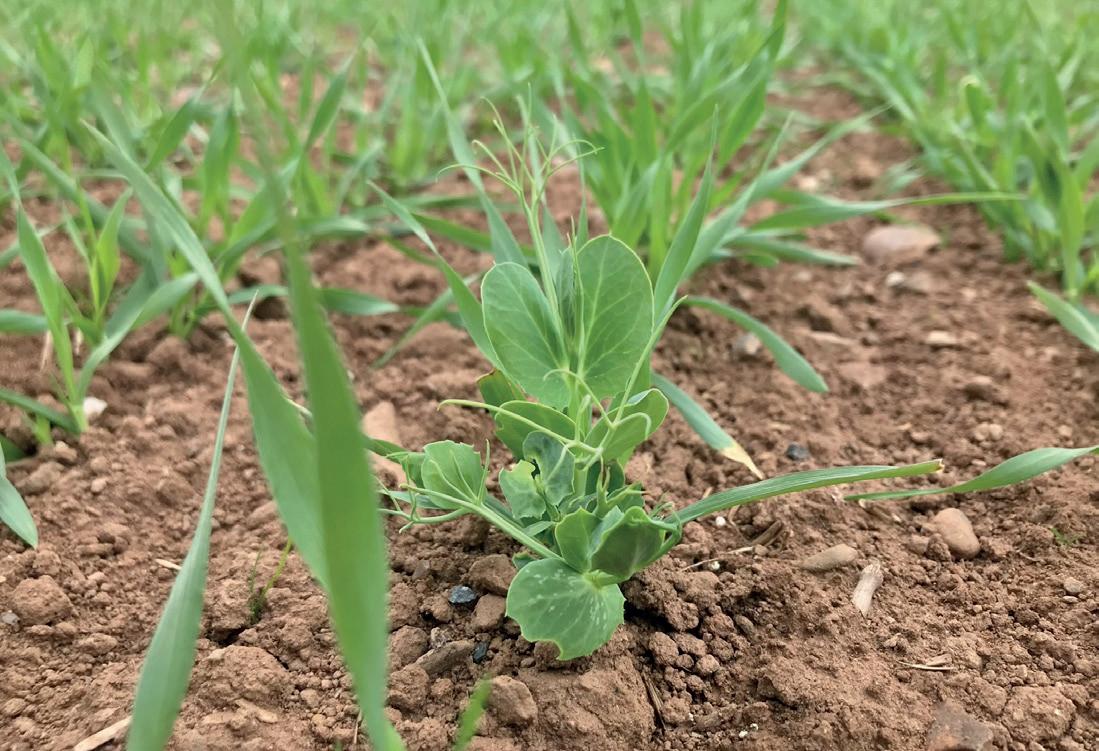
After signifi cant lobbying, NFU Scotland secured the return of some £46.1 million of uncommitted agricultural support funding in the Scottish Government’s budget in December. We also pressed the Scottish Government to use this funding for capital grant funding with up to £20 million in 202526 and the remainder in 2026-27.
In the aftermath of the December budget, we met with the Cabinet Secretary for Rural Aff airs and Islands Mairi Gougeon MSP and Minister for Agriculture and Connectivity Jim Fairlie MSP.
We made it clear that we needed a new, accessible capital grant scheme to help agricultural businesses deliver the Scottish Government’s Vision for Scottish Agriculture, with priority given to young farmers, new entrants, smaller agricultural businesses and investments in electronic identifi cation (EID) equipment and water resource management.
And at our AGM in February, the First Minister John Swinney MSP confi rmed this and committed to making the application process simple.
With other commitments in the Agriculture and Rural Economy portfolio, a new Future Farming Investment Scheme (FFIS) is about to be rolled out with a budget of some £14 million for 2025-26.
The objectives of the FFIS are for the capital support to help deliver the outcomes such as;
• improved business effi ciency and sustainability
• protecting, restoring or enhancing the environment
• reducing greenhouse gas emissions
• mitigating the eff ect of climate change
Normally grant payments are made once agricultural businesses have incurred the cost of purchasing eligible supported items. However, we have worked with the Scottish Government to




Jonnie Hall Director of Policy
now off er capital support upfront to ensure farmers and crofters can invest to help their businesses deliver on the Scottish Government’s objectives without adding stress to their own cashfl ows.
In another signifi cant change, it looks likely that the FFIS will be able to off er up to 100 percent of the investment cost.
Other likely aspects of the FFIS include;
• only one application would be allowed per agricultural business
• grant would be paid once an ‘Off er of Grant’ had been accepted
• businesses will need to submit evidence of what was purchased and how much it cost within six to 12 months of accepting the ‘Off er of Grant’
• the items purchased using FFIS support must only be used on the agricultural businesses own farm or croft and retained for at least six years from the date the grant was paid

All Scottish farmers and crofters will be eligible to apply if;
• they meet the legal defi nition of a “farmer” and undertake “agricultural activity”
• they submitted a Single Application Form (SAF) to claim funding by 15 May
• the total area of eligible agricultural land (excluding common grazing shares) declared on 15 May is greater than three hectares
• they have at least two of the fi ve Whole Farm Plan (WFP) requirements by 15 May – as will be the case to claim the Basic Payment Scheme (BPS)
The maximum sums a business will be entitled to apply for is likely to be based on the total area of land (excluding common grazing shares) declared in this year’s SAF.
• Under 30 hectares – up to £5,000
• 30-150 hectares – up to £10,000
• More than 150 hectares – up to £20,000
There would be no minimum amount of support that could be applied for.
The Scottish Government has also made it clear it should not provide a list of items that would be eligible for support but give farms and crofts a choice over the most appropriate capital investments if it helps deliver on at least one of the schemes objectives – see earlier.
Applications should not take any longer than 20 minutes to complete
and will not require any supporting information, such as competitive quotes. Instead, there will be a series of simple questions about their agricultural business and the planned investment, including estimated cost and grant applied for.
and, if it works for all concerned, why can’t this become the blueprint for delivering competitive support under the new four-tiered framework of support in the near future?
There is a clear intention to give farmers and crofters the option to invest
The intention is then, within six to 12 months of receiving payment, a farm or croft would provide proof of purchase and payment to verify what was purchased and the amount paid.
With a budget of around £14 million for the coming fi nancial year, the new FFIS is hardly a panacea - despite all its good intention. Managing expectations on this one may be very challenging, but much better to have a new capital grant scheme targeted at needy businesses that can deliver meaningful outcomes than see that funding melt away as a token sum added into BPS. Moreover, there is a signifi cant departure here in the content, structure and prioritisation that we have engaged with the Scottish Government on for the new FFIS. This must be commended
with Scottish Government support if it will contribute to objectives that are also good for the bottom line of every agricultural business.
The intention to make the operation of such a capital grant scheme far more pragmatic and practical is evident too –something we have long been seeking. And with 100 percent intervention rates, no need for multiple quotes, and ‘money up front’, this must be welcomed.
There may be one or two issues, as there is with any new scheme, but I am confi dent that our engagement with the Scottish Government from the outset will once again deliver what our members want, meet the needs of the wider agricultural industry and help the Scottish Government eff ectively deliver on it current and future policy priorities.








This Farming Life’ has been a resounding success for the BBC. The programme follows the lives of farming families across Scotland over the period of a year. Each featured family allow cameras onto their farms and into their lives, providing viewers with a valuable insight into what life on croft and farm is like. Life, at times, is tough – but never dull.
The cameras are there to capture it all. It’s been great to watch over the years and many of our readers will know that some of the families featured have been/are NFU Scotland members.
Series 1 first aired in March 2016 and nine years on series 7 of the show has almost concluded. Viewers however will be delighted to know that filming for series 8 is already well underway!
I took the opportunity to catch up recently with the programme’s Executive and Series Producers, to ask them a bit about why the programme is so successful, before catching up with a few of series 7 ‘stars’. Here is what they said;
“The series maintains a loyal audience and broadcasts on BBC Scotland (Tuesday evenings) and nationally on BBC Two (Sundays). It’s also now available to binge watch from day one of the first transmission on the BBC’s on-demand service (iPlayer).
“We’ve always featured amazing individuals in each series. They are passionate, authentic, and willing to share their real-life farming experiences with viewers. Nothing is scripted. Our challenge is how to edit it down – a good problem to have, but a challenge nonetheless. We end up with so much great material, but each episode has a time limit. We work carefully to ensure we represent events accurately and give viewers an authentic understanding of farming life.
“It’s an absolute privilege to work on This Farming Life. Educating our viewers so they have a greater appreciation of the hard work, issues,


challenge, and rewards involved in farming across the country, and increasing awareness of where food comes from, is incredibly important.”
I then caught up with a few of the families involved with This Farming Life series 7 to get their take on the whole experience.
Logie Farm, Newburgh, Fife
Approx 500 acres, mixed enterprise (cereals, flock of 560 breeding ewes) plus additional farm rented for grassland.
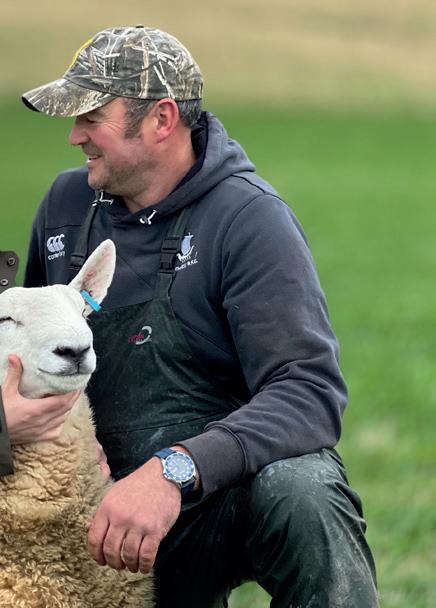
Motivation for taking part
Asking about their motivation to take part in the programme, I asked if they had watched previous series, Jo Morris said, “Doesn’t everyone in farming watch the programme? Yes of course we had. It’s a regular view for us over the winter months.
“There were several reasons we wanted to take part. Primarily we thought it was important to share our story to be honest about the highs and lows of succession planning and following a different path. We recognised that home is where you are with family – not necessarily bricks and mortar. Andrew had been working with his dad up north managing a herd of 120 odd suckler cows and 200 breeding ewes. Without any help, the workload was becoming unmanageable the way things were. Between family illness, recognising no one was getting any younger and having three children under three years old, we realised this wasn’t sustainable. We also thought being on the show would be a fantastic opportunity to have a snapshot of the three generations farming together –something we could do and can look back on for years. Plus, we believed it would be good exposure for our unique holiday accommodation enterprise.”
Easy of working with camera/crew?
“At first it took a bit of getting used to the cameraman, but he and the entire crew have been amazing to work with. Mark (cameraman) almost became part of our family. He just got on with filming as we got on with work. If anything, it was harder when he left. We missed him however we keep in touch regularly.”
Particular high or low lights of your experience?
“We were proud of ourselves for being brave enough to share our difficulties during spring last year as it was an extremely tough time. We lost so many lambs in the episode that was called ‘lamb-ageddon’ and also lost a substantial part of our cereal enterprise. These unprecedented circumstances were very hard to deal with mentally, physically and financially. The episode was hard hitting and produced so well. It’s not easy farming and sharing our experience, but the financial blow and lives loss, was so important to share with the wider audience. It’s delivered a raw and hard-hitting message about the realities that many face in this business.
“We were also delighted to have a record of our daughter, Emily, winning reserve champion in the junior young handlers at the Fife show, as well as the twins also doing well. It was a sunny, happy day for us all.

“Another very extremely well produced episode was when we went back to Caithness and Andrew was playing rugby in memory of his friend Alec Mill. We were nervous about this. So many emotions are involved, particularly for Alec’s family, but we thought it was important to highlight mental health struggles within the rural communities in the hope to encourage people to speak about their concerns and issues. It’s not always easy to do. We were really pleased that this was all covered in a dignifi ed way which we are sure will be appreciated by others too.”
Would you recommend taking part to others?
“Defi nitely. Many people have appreciated our honesty about our good and bad experiences. We haven’t sugar coated anything. We’ve had people reaching out to us, saying how grateful and helpful it has been watching
us discuss issues such as succession, fi nances etc.. If we can have helped or inspired even one other person to have a diffi cult conversation or make changes, then that’s an added benefi t.
“It’s never too late to change things up or follow a dream. If things are not working for you or you’re not happy, consider trying something diff erent.
“We now have this permanent record of the three generations farming and will watch it for many years to come. It’s very special and we are grateful for the opportunity.”
Pre-series 7 get together
Shortly before series 7 whet on air, the families involved got together with everyone involved in its production. Refl ecting on this occasion, Jo added, “It was great to meet all the producers, camera crew and participants. Everyone was really very supportive and it was just a lovely.”
It’s never too late to change things up or follow a dream. If things are not working for you or you’re not happy, consider trying something different.


Summerhill Farm, Balmaclellan, Castle Douglas
1800 acres, mixed enterprise (Sheep & cattle) plus holiday lodges
Speaking with Nick in the midst of a busy lambing day, I asked him what was the motivation to take part in the programme and if they had watched previous series so knew what it may entail?
“Holly and I used to live in London and we’d watch it there. We’ve always loved the show and in a way it was part of the inspiration to move to come back north and farm.” He said.
“So that was one reason we wanted to take part – our love for the show –but there were a few others too.” Nick explained. “I’d moved into EasyCareTM sheep* so I really wanted to promote myself as well this utterly fantastic breed.
“I have my own podcast called ‘Farming Funny’ – it’s three farmers getting together and discussing various topics linked to our farming lives.”
I did ask it this was something that readers would be interested in tuning into, to which Nick replied, “mmm – the podcasts do sometimes have a few rude words in them.” So, I agreed to issue the following warning to younger readers ‘please make sure you have an adult’s approval before listening.’
“We also have some holiday lodges and hoped we could show and raise awareness of those as being part of our business.
“Basically, we had loads of reasons to take part but ultimately, we are passionate about educating the wider public about where and how their food is produced. Farming is tough and rewarding and this is a great medium to get that message across. It tells the truth – the good, the bad and the ugly included.”
*Info
According to the EasycareTM website, the EasyCareTM Sheep is a revolutionary breed of sheep which requires minimal shepherding and veterinary care, sheds its fleece in the summer, does not need shearing and yet offers excellent meat yields and lambing ratios. The fleece is kempy, leaving a dense hair covered in lanolin. The shed fleece rapidly decomposes as a natural soil conditioner. The breed seldom succumbs to heat stress yet the dense nature of their fleece means they can withstand harsh weather.
The ewes seldom require assistance at lambing. They have strong maternal instincts, are milky and will rear their lambs without human intervention.
The breed is a wellestablished commercial sheep with flocks of 1,000’s all over the UK, yet it is also an ideal sheep for the small holder. The rams can be used over other breeds to remove the wool. In three to four crosses the fleece should be shedding, this is ideal for hefted flocks as it means the flock remains on the hill yet acquires the benefits of the fleece shedding coat.
The breed is proving extremely popular and successful with breeders in today’s farming environment.

Easy of working with camera/crew?
“We had the same two ladies fi lming us over the period and both were amazing! In fact we really miss them not being about. They were great fun. The whole experience was extremely positive and fi lming was so easy. We probably planned to add half an hour on to some of the agricultural work to allow for fi lming which wasn’t a hardship and was easy to do. They made it easy as they were so effi cient. We’re still in touch on a regular basis.”
Particular high or low lights of your experience?
“That’s an interesting question. Without doubt the episode where we lost a great Charolais calf was a horrendous experience for us on a personal level. The calf had to be jacked out, was alive for a bit but in the end, we lost it. On the one hand we grateful that this was caught on fi lm – it was an important

We’ve had nothing but positive feedback from farmers, friends, family, local community you name it.
reality to show viewers, but then having a camera in your face was hard to deal with at the time. The production crew did a brilliant job of capturing all the emotion and eff ort that was involved. It’s a low point but equally something that we appreciated being reported on so sensitively.”
“The highlight was probably seeing the episode of us during lambing. I was all over the place – it was hectic and stressful. I was nervous that the intensity of what was going on wouldn’t come across as it was on fi lm, but I was wrong. It captured events perfectly and we were delighted.”
Would you recommend taking part to others?
“100 percent we’d do it all again. We’ve had nothing but positive feedback from farmers, friends, family, local
community you name it. That means a lot. We would recommend anyone thinking about volunteering to be on the programme to go for it, especially if you have a story to tell that would help demonstrate what farming is all about.” I asked if he gets recognised when out and about? “Not really me, I must look unapproachable. But Holly and my Dad (Derek) seem to get stopped a lot in the local shops. It’s always very supportive and positive feedback.”
Asking about how the pre-series get together with the other families was, Nick explained how great it had been, especially to ease nerves before the series started to air. “We all seemed to get on well. In fact, we regularly communicate with each other and as the series has gone on, we’ve exchanged feedback with each other. There will be a few of us meeting up at the Royal Highland Show for a few beers and I’m looking forward to that.”
A huge thank you to everyone involved for sharing their experience of working on the programme with Scottish Farming Leader readers and for the BBC for providing the supporting photos. Let’s look forward to meeting many more families and series of ‘This Farming Life’ in the future.
















































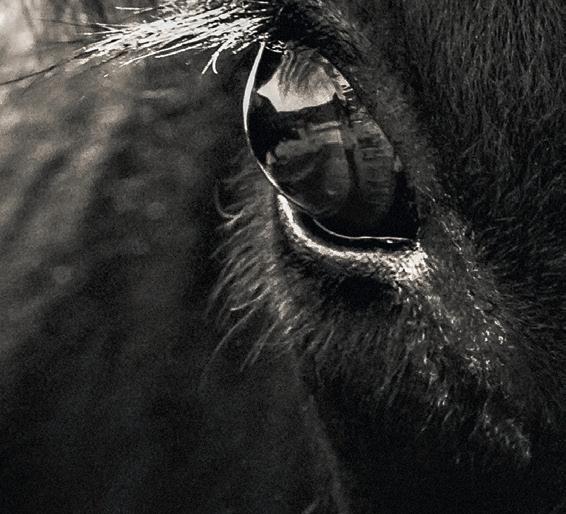





The Royal Northern Agricultural Society (RNAS) is getting set for BeefTech 25, taking place at Home Farm, Kininmonth, Peterhead on Wednesday 28 May.
RNAS holds a specialist event every two or three years. Each specialist event has a diff erent focus, from livestock, arable and grassland management to family days out.

This year’s event continues that long tradition of specialist events hosted by the RNAS over the years and will see a broad range of activities to promote agriculture and the beef industry within and outside the farming sector.

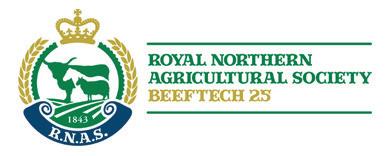
The one-day programme will be packed with activities centred on education and knowledge sharing through the likes of demonstrations, seminars, exhibitions and more with a focus on eating quality. Something not to be missed.
The farm hosts focus mainly on finishing cattle and a suckler herd of predominantly Saler cows put to an Angus or Limousin bull. Lambs supplied from Shetland are finished over the winter. Their arable enterprise focuses on feed barley for themselves with the addition of OSR, wheat and milling oats for sale and some local contracting work. There will be lots to see and engage with.
According to Brian Ross, in his role as joint event convenor alongside Scott Mathers, “BeefTech has been extremely well received by the industry – with over 70 trade stands booked - and we are indebted to the numerous sponsors


and businesses that are supporting the event. For any beef producer or new entrant, it really is a one stop shop.”
BeefTech 25’s principal sponsor is McIntosh Donald abattoir at Portlethen, Ewan Hutcheson McIntosh Donald procurement said, “The event is a great opportunity to promote the beef industry and also highlight all the stakeholders within the supply chain that help generate the industry, showcasing their commitment, talent and passion for the sector”.
In addition to trade stands, there will be a breed society marquee, barley trial plots, working demonstrations of feeder wagons, an autonomous tractor and a ‘green on green’ sprayer (using AI to target spray weeds). On foot, there will be a ‘self-conducted’ farm tour.
“Through the day, seminars will address the challenges facing producers and hopefully, show a way ahead for the sector in the short and long-term, concluding with a more light-hearted matter of opinion.” added Brian Ross.

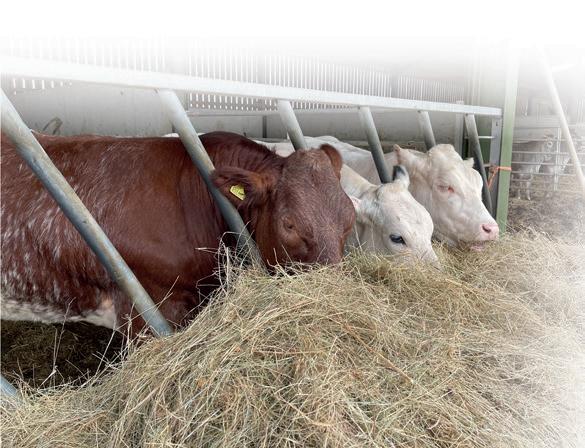













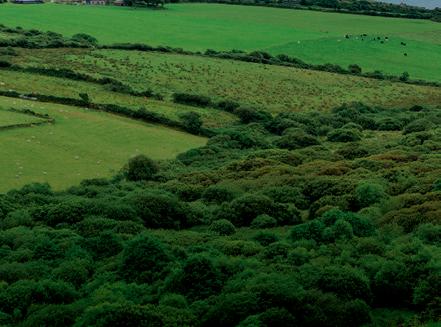






The seminar programme is as follows;
9am
Beef Breakfast - Opportunities
10.30am
Virtual Fencing Technology
1pm Future Proofing For Farming Business
Plus, away from the business element, there will be stock-judging and charity auction.
BeefTech is open from 9.00am and kicks off with a sponsored Beef Breakfast entitled Opportunities.
Tickets for the breakfast are free but must be reserved online beforehand.
Readers can visit rnas.org.uk to book tickets (limited number available) for the Beef Breakfast. This is also where you can buy event tickets and find further general information about the event.

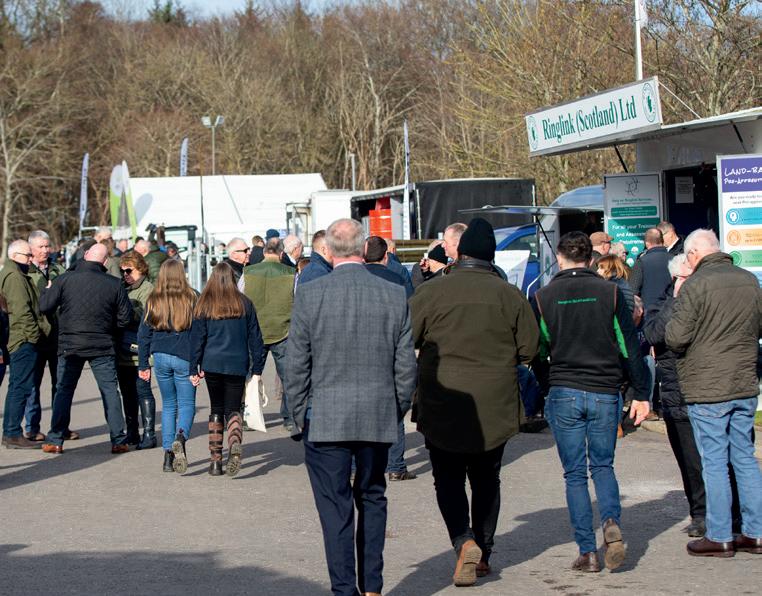
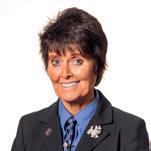
Lorna Paterson
REGIONAL MANAGER



VICE-PRESIDENT
NFU Scotland will have an exhibition stand at the event and would love to see you drop by for a chat, cuppa and a share some latest news/thoughts. Among those who will be joining Regional Manager Lorna Paterson on the NFU Scotland/NFU Mutual stand will be Vice-President Robert Neill looking forward to meeting members and nonmembers alike, Nigel Miller presenting details on some Livestock Health Scotland projects, Hugh Fraser NFU
Scotland Livestock committee Chair, and Tom Graham NFU Scotland Commercial Manager who will be on hand to talk about member benefits. NFU Mutual staff from the Keith, Turriff and Laurencekirk offices will also be there meeting and greeting members. Plus FarmTalk, the North East mental health charity will be present with Men United’s Sandy Garvock to promote peer-to-peer support services. We will also be launching the Sma’ Wids project on stand.












LOTHIAN AND BORDERS


REGIONAL MANAGER



Lindsay Brown
07780 441 750 lindsay.brown@nfus.org.uk
Ivisited Holyrood with Jamie Smart and Al Walker recently to meet Lorna Slater MSP and discuss the nutrifi cation of Linlithgow Loch. Jamie has been involved in similar projects in the past and was able to share previous fi ndings and knowledge. He explained how actually the drainage catchment from farmland is far smaller than they thought. We were able to discuss all the regulations which are in place and the improvements in farming practices which limit the potential of run-off. Ms Slater has an invitation to visit Jamie’s farm on the table to discuss issues again. It is good to have these open lines of communication.
Are you hearing all about it? Have you changed your email or mobile? If so, let us know so we can ensure your details are up-to-day and that you don’t miss out on what is going on in Lothian & Borders.
Craig Hoy, South of Scotland MSP, visited Stoneypath Farm to learn more about the challenges facing sheep farmers in East Lothian. Standing in the busy lambing shed with Roy Brown and Elizabeth Massie, they discussed how diffi cult it is to farm now with increased input costs. Even with the increased prices at the market, these
infl ated costs negate any profi t potential. They stressed the importance of the coming Agricultural Bill and the need for ringfenced multi-annual funding to provide some stability to the industry. All these pressures have a detrimental eff ect on mental health.
Farmers can deliver all the answers for the environment and biodiversity and be profi table and sustainable too.


ARGYLL AND ISLANDS


FREGIONAL MANAGER
Lucy Sumsion
07787 434 104 lucy.sumsion@nfus.org.uk
armers and other land managers in Southwest Cowal are facing ongoing challenges due to increasing deer populations, leading to agricultural damage, economic losses and added workload. In response, NatureScot is issuing a
Section 6A request for a collaborative Deer Management Plan across Southwest Cowal landholdings, aiming to find a balanced and practical approach that benefi ts both farmers, foresters and the environment.
This process is being undertaken in close collaboration with NFU Scotland, Scottish Forestry and local stakeholders. The goal is to reduce damage to agriculture and associated farm woodlands and limit the burden on farmers while maintaining productive farming businesses.
A key element of the plan will be exploring funding opportunities to support deer control measures, ensuring
that pressures do not fall solely on farmers. Additionally, the initiative will look at how deer management can contribute to the restoration of Cowal’s temperate rainforest habitat, a vital ecosystem that supports biodiversity and climate resilience.
NatureScot recognises that managing deer numbers effectively requires a collective effort and will liaise closely with farmers to ensure their voices are heard to help shape a plan that is both practical and fair for all involved.
For further information please contact Nathan Berrie, Wildlife Management Officer, NatureScot. Email: nathan.berrie@ nature.scot Mobile: 07407856433


Seen here reading his copy of the Scottish Farming Leader is one of our youngest family members who is keen to follow in the footsteps of his dad, Alastair Dixon. Alastair is currently the Mid-Argyll Branch Chair, Argyll & the Islands Regional Board ViceChair and Next Generation Committee rep.
Good to see the next generation taking a keen interest!
The following members represent the Argyll & the Islands region on the national committees.
Crofting and H & I
Chris Cameron (Lochaber & Sunart), John Cameron (Mull), Dugie Maccormick (Kintyre) & Euan Warnock (Lorn)
Environment & Land Use
Jamie Mellor (Lorn) & Claire Simonetta (Mull)
Legal & Technical
John Dickson (Bute) & John Macaulay (Lochaber & Sunart)
Less Favoured Areas
Angus Dickie (Lorn) & Peter Kennedy (Cowal)
Livestock
Andrew Bevis (Lorn)
Milk
Sandy Pirie (Kintyre)
Next Generation
Alastair Dixon (Mid-Argyll) & Scott McLellan (Islay)
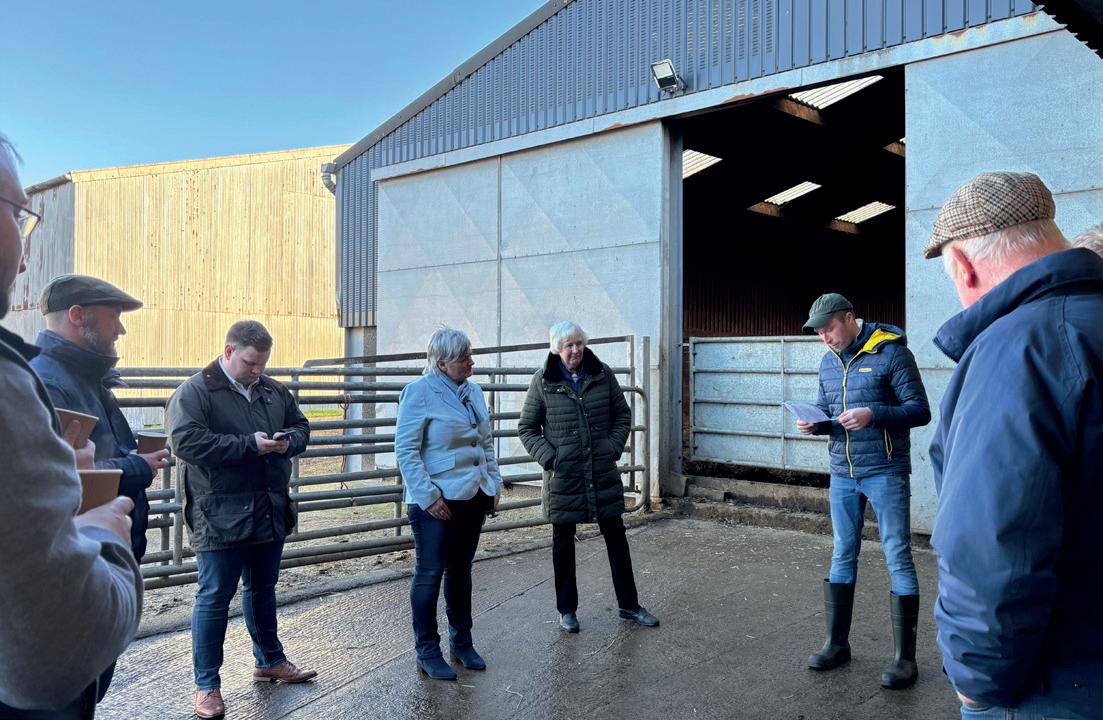




REGIONAL MANAGER Holly Fitsimmons
07775 838 926 holly.fitzsimmons @nfus.org.uk
It’s been full steam ahead following on from February’s Tractor Rallies. Group Secretaries and Ayrshire members have kept the pressure on by continuing to engage with local MP’s. Regional Chair John Kerr was in London on the 4 March where he met with MP’s Lillian Jones, Irene Campbell and Alan Gemmell.
In February MP Lillian Jones joined Kilmarnock branch members at Girtridge farm courtesy of chair John Howie and she also paid a visited to David and Cora Cooper’s farm in March. Also in March, Caroline Montgomery hosted MP Elaine Stewart at Lessnessock Farm. Members have also made a point of attending MP surgeries across the region over the past few months in order to get time with all four Ayrshire MPs to discuss the impact of recent budget proposals.

• MP Irene Campbell x one member attended.
• MP Elaine Stewart x two members attended.
• MP Alan Gemmell x three members attended, and Mr Gemmell is due out on farm mid-April.
• MP Lillian Jones x one member attended.
Thank you to everyone who sent letters and attended meetings over the last few months. Sharing your unique
experience and situations does make a diff erence and collectively is far more eff ective. So, keep up the good work and please reach out to me if I can help with any political engagement.
North Ayrshire and Cumbrae and Kilmarnock branch members also got round the table with MSPs Kenneth Gibson and Willie Coff ey. Members had the opportunity to highlight where they see the most eff ective uses for any future capital funding should go and stressed the importance of a simpler less prescriptive process.




REGIONAL MANAGER
Sheena Foster
07789 796 582
sheena.foster
@nfus.org.uk
We want to ensure that all our members in the Forth and Clyde region continue to receive important updates, news and event information from NFU Scotland. If you have recently changed your email address or are not receiving NFU Scotland communications via email, please get in touch to update your details.
Keeping your contact information upto-date ensures that you don’t miss out on key industry news, policy updates, upcoming meetings, and exclusive member benefi ts. Whether it’s alerts on important agricultural developments or invitations to local events, we want to keep you informed and connected.
The recent Balfron and Menteith Branch meeting saw a great turnout as members gathered to hear from a truly inspiring guest speakerCammy Wilson of The Sheep Game. Cammy, a well-known fi gure in the agricultural community, captivated the audience with his journey from the police force to becoming a successful sheep farmer and social media personality.
With a mix of humour and honesty, Cammy shared insights into his early career in the police, detailing the challenges he faced and the pivotal moments that shaped his future. He spoke passionately about the role of both hard work and luck in his journey, emphasising the importance of perseverance, seizing opportunities, and adapting to new challenges.
Attendees were engaged throughout the evening, asking


questions and sharing their own experiences in farming and rural business. Cammy’s down-to-earth approach and relatable storytelling made for an enjoyable and thoughtprovoking discussion.
A huge thank you to Cammy for sharing his time and wisdom, and to everyone who attended. We look forward to welcoming more inspiring speakers in the future!


SELLARS is part of the CLAAS dealer network. We sell agricultural machinery and parts and we service machinery, too.

Alongside CLAAS, we are also dealers for several other leading agricultural machinery manufacturers, including Lemken.
From our 7 SELLARS branches, our knowledgeable teams provide machinery and expertise to customers across Scotland, from the north all the way down to south of the Firth of Forth.



Visit www.sellars.claas-dealer.co.uk to find your nearest branch for all your agricultural machinery, parts and servicing requirements



























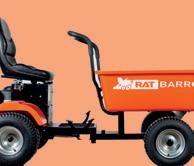























Geese in Shetland continue to be a problem for crofters and farmers. As you look around the land, there seems to be an increasing number of them year-on-year.
Talking to Mat Wilmot from RSPB Shetland, the most common goose here is the Greylag, however other species can also be seen, including, Brent, Canada, Barnacle, Pink-footed, Taiga Bean, Tundra Bean, White-fronted geese.
The Greylag goose is a breeding resident to Shetland and can be seen here over the summer. Additionally, the Greylag is likely to cause the most damage to crofts and farms.
Shetland is not in any goose control




AREGIONAL POLICY ADVISOR
John Laughton
01856 872 048
john_laughton@nfus.org.uk
s I sit and write this on 1 April, wary that it is April Fool’s day, the sun is streaming in the window with a good bit of warmth in the sun –we are long overdue a decent spring! And what great weather for the fi rst cruise liner of the season. Love them or hate them they are crucial to the Orkney tourism industry and, with 178 cruise liners booked in to visit Orkney
scheme, but crofters feel action is needed to control the number of geese on the Island. Having put out an email recently asking for evidence of geese control on land, it’s clear crofters are attempting to control this issue with little impact as the geese continue to destroy crops and good grass.
NFU Scotland wound like information from members - are geese on your land? How are they affecting the areas they settle on and what measures you are taking, if any, to control geese? If you have not already sent the information in, please consider doing so. Please email myself or talk to one of our committee members.




Lee Smith
07554 741 030
lee.smith@nfus.org.uk
in 2025, that is a signifi cant number of passengers looking to spend a pound or two in Orkney. Farm businesses who have diversifi ed into tourism stand to benefi t from the infl ux of day tourists. What farm businesses do not stand to benefi t from is the increase in raven attacks that have been evident during lambing and calving time. Large groups, with reports of as many as 40, of young immature non-breeding ravens are a particular cause for concern. Members have provided us with evidence of these large fl ocks of birds and the damage they are causing to vulnerable livestock which has been invaluable when discussing the issue with NatureScot and Scottish
hetland chair Cecil Eunson and myself recently met with newly elected Tim Eagle MSP and Jamie Halcro Johnston MSP. They were both interested in crofting issues experienced in Shetland. Tim, a farmer from the Inverness area and Jamie, a landowner in Orkney were very aware of recent changes and understood the issues around peatland restoration, whole farm plans, changes to government subsidies through the new tier system and sympathetic to the general feeling of crofters. We discussed the impact on crofters and communities if the government did not help support smallholders and the potential consequence of losing a way of life.

Government to devise a solution to this ever increasing problem. The issue has recently been raised by Liam Macarthur MSP at FMQs with baselining the current population of Ravens in Scotland as a starting point from which to build and take action.




REGIONAL MANAGER
Lorna Paterson
07786 860 453
lorna.paterson@nfus.org.uk

Our local Royal Northern Countryside Initiative (RNCI) board are working with 160 local schools and over 9500 pupils, supplying them with over 400 Windowsill Garden project kits, comprising seeds, trays, compost and guidance for the production of vegetables and fl owers as part of STEM education. Great support from Loirston Trust ensured this was possible. Our fabulous Regional Co-ordinator, Ali Johnston, is seen here delivering kits to St Peter’s RC school in Aberdeen, pictured with Zosia from P5 who designed the winning pea packet and proud Headteacher Liam Sturrock. Alison says: “Thank you to all our board members for dedicating time and eff ort in ensuring these were all delivered ahead of the Easter break.”
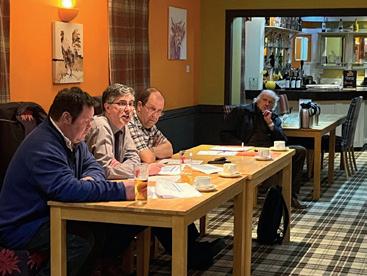

Our Environment & Land Use representatives, Patrick Sleigh and Alistair Sinclair participated in what can only be described as a fantastic event, hosted by Nature Scot at Mar Lodge, Braemar. The day comprised key discussions relating to the loss of wader bird populations, and stakeholders were united in trying
to identify solutions which all farmers could implement to help mitigate the decline. Badgers and other key predators were identified as being a substantial part of the problem. Another major sad issue is that Scottish Government seem to have run out of monies to support this Waders Group, so lots of head scratching going on to seek new support.

Well done to New Deer branch for hosting a great meeting with Johnston Carmichael’s partner guest speaker, Graham Leith. Needless to say, the key discussion topic was IHT!
Our North East mental health charity, “FarmTalk” alongside our partner organisation, Men United were fortunate to be selected for news feature by STV on 17 March, and featured our Regional Chair, Kevin as well as Men United’s Sandy Garvock and Kelly Dobbie. It’s great to know that more farming folk are approaching FarmTalk to share concerns and personal trauma. Remember this confi dential service is available to anyone associated with our industry. Please do call 07732 272227 or email: farmtalkwelisten@gmail.com at anytime of day or night.
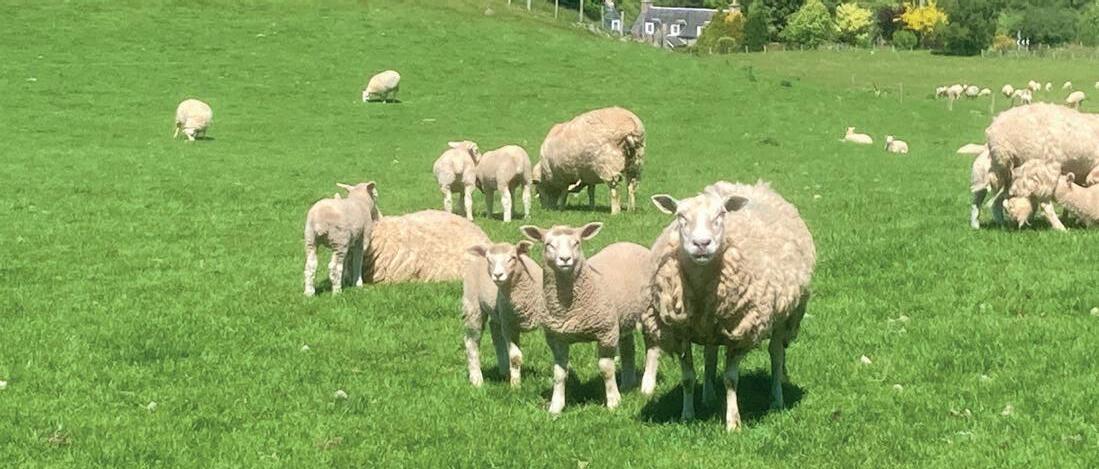




AREGIONAL MANAGER
Ian Wilson
07775 915 988 ian.wilson@nfus.org.uk
s summer approaches, the UK Government’s tax changes continue to cause widespread concern among members and businesses. The Chancellor and Treasury frequently alter their justifi cations for these changes, seemingly ignoring the impact on “family farm businesses” they claim to protect.
The usual spring challenges that
come from the season and the weather are now almost being eclipsed by those caused by the increasing numbers of protected predators that are not only aff ecting farmers’ and crofters’ sheep and even cattle but the vulnerable wildlife that we all want to see fl ourish. The number of ravens is increasing and while licenses are available to protect livestock from attack it’s a challenge to get one for the fi rst time. Those aff ected must apply for licenses and ensure they put in their bag returns and apply for extra numbers if needed. Sea Eagles and Badger issues are also increasing greatly - we need to get to a simple eff ective way of licensing the control or removal of the birds and animals habituated to livestock attacks.




TREGIONAL MANAGER
Kate Maitland
07919 001 23 kate.maitland@nfus.org.uk
he River South Esk Catchment Partnership in Angus works closely with landowners to improve the natural environment for the benefi t of biodiversity, society and the economy. A new role within the Partnership has been developed to engage and provide support for local farmers, who will be invited to contribute to the latest Catchment Management Plan at a consultation event in June.
Ann-Marie MacMaster joined the Partnership in September 2024 as their Land Use and Nature-Based Solutions Project Officer. With a focus on the mid to
lower catchment area, this new role aims to support farmers to:
• increase the resilience of their farms to cope better with extreme weather events by adopting nature-based interventions
• make improvements following completion of biodiversity audit, carbon audit and soil analysis (as part of the Whole Farm Plan)
• feed the nation in the least impactful way to the environment
If you farm in the South Esk Catchment in Angus and would like to arrange a free visit from Ann-Marie, would like more information on the Catchment Management Plan consultation or would like to be added to the Catchment Partnership e-mail distribution list, please contact Ann-Marie directly on amm@eskriversangus.uk or 07766 032779.
For our Regional trip this year we are heading to Orkney on Tuesday 20 and Wednesday 21 May. Final arrangements are being made as I write for what promises to be an excellent few days packed with interesting, informative visits and tremendous hospitality. Anyone wanting to come along please get in touch with myself asap so that I can confi rm details. Places are limited so you may be too late!!
Please take the opportunity to the visit the NFU Scotland/NFU Mutual stand if you are at any of the following shows. Refreshments will be available and members of staff present to address any areas of concern.
Fife Show Saturday 24 May
West Fife Show Saturday 7 June
Angus Show Saturday 7 June
Alyth Show Saturday 14 June
Kirriemuir Show Saturday 19 July
Braco Show Saturday 26 July
Perth Show Friday 1 and Saturday 2 August
Kinross Show Saturday 9 August
The Atholl & Breadalbane Agricultural Show & Highland Gathering Saturday 9 August




REGIONAL MANAGER
Mhairi Dawson 07718 425 053
mhairi.dawson@nfus.org.uk
The Wigtownshire NFUS branch plays a vital role in supporting and representing local farmers. As we move forward, our focus is on building stability, strengthening our network, and ensuring our members’ voices shape the future of Scottish agriculture.

I’ve been Wigtownshire Branch Secretary and NFU Mutual Agent for over two years, having previously held a similar role for 20 years in Winchester, Romsey and Southampton. Alongside this, I help run our 200-acre family farm near Troon, focusing on pedigree Suff olks, summer grazing, contract-grown cereals, and holiday lets. The past two years have brought change to the Stranraer offi ce, but we are now in a stronger, more stable position. Wigtownshire is a fantastic farming region, and I’ve enjoyed meeting so many of our hardworking members.

I look forward to working with Colin as Chair and James Baxter as Vice-Chair. Our focus this year is on growing membership, strengthening local support and aligning with NFU Scotland’s national advocacy.

I’m honoured to chair the Wigtownshire branch, following in the footsteps of respected local leaders. My NFU Scotland journey started with the Next Generation Committee, leading to roles on the National Board and D&G Regional Chair. Our members are the driving force behind NFU Scotland. They see opportunities, challenges and solutions firsthand. We need to give them a platform to influence policy and ensure decision-makers act in their best interests.
Together with Michael, I want to build a strong, engaged branch where members shape the future of farming in Wigtownshire and beyond. Get involved—your voice matters.












CEREAL BA SED
LOW FIBRE AND A SH CONTAINS SUGAR BEET PULP HI PRO SOYA IN 18% NUTS & ROLLS
• Boost milk yield and milk quality
• Increase colostrum production
• Maximise return from lambs
• Improve ewe health
• Vitamin E 150 iu/kg Selenium 0.5 mg/kg





Broadwood Drumlithie Stonehaven Aberdeenshire AB39 3X A Tel: 01569 740251 Fax: 01569 740686 Email: sales@ecvg co uk www.ecvanimalnutrition.co.uk


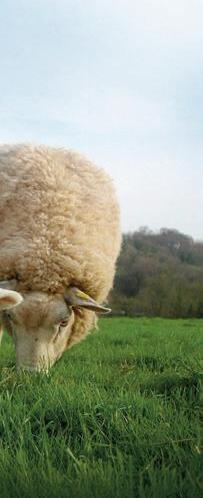


SINGLE PHASE, 3.5HP,1800PSI, 11LPM £2665
SINGLE PHASE, 5HP,2200PSI, 14LPM £2875
THREE PHASE, 7.5HP,2700PSI, 15LPM. .£2800
THREEPHASE, 10HP,3000PSI, 18LPM ..... £3150
PETROL, 16 HP,3625PSI, 25LPM ............. £5650
COMMERCIAL METAL BUNDED FUEL TANKS STANDARD SPECIFICATIONS
•3mm British steel
•230 volt /60litreper min pump
•6m delivery hose
•Water &particulate filter
•Mechanical flow metre
•Autoshut offnozzle
•Contents gauge
•Deadlock with 2keys
•Lifting Eyes
•Steel box section across the base for forklift access andtoraisethe tank from the floor
•Painted green as standard(Anti -corrosion paint)
•BS799, OFS T200 & SSAFO compliant

















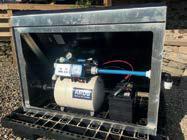



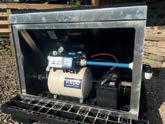


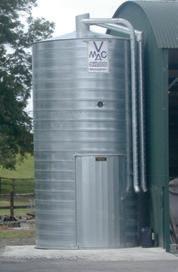













No leaks - even the stretch areas are waterproof.
No need to change boots after workwith wider fitting at toe area, a beefy heel counter and whole cut vamp, this is a waterproof safety boot with gravitas and real substance, which you can wear all day, every day.
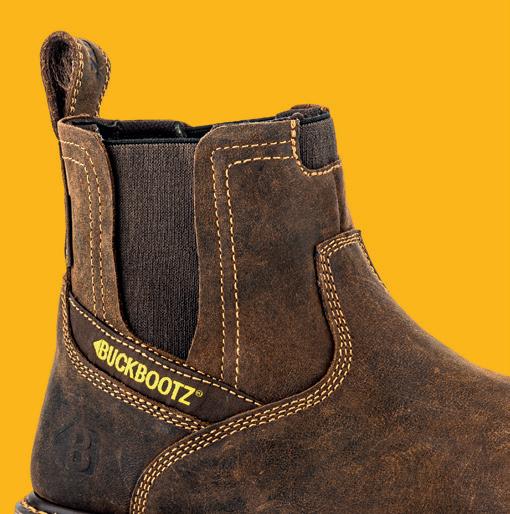
No date clock on our soles - B1180s K11 rubber outsole withstands the toughest of conditions, including chemical or fuel spills. Tough, durable yet light weight with ladder grips for vital instep sole bite when climbing on and off machinery.





No struggling with two pull loops - B1180 has three dimensional Buckflex fitting with three flex-stretch areas at the boot collar making fitting and removal a stroll in the park and enabling the collar to retain its neat look and snug fit at all times.

No need to compromise on good looks - using construction and components designed to withstand the roughest treatment, B1180 combines good looks and strength with light weight thanks to dual density outsole construction, super light safety toecap and kevlar nail stop midsole.



See the full range of Buckbootz dealer boots at www.buckbootz.com
To find your nearest Agricultural Merchant stockist call 01382 82 82 00 or email info@buckbootz.com
No worries about qualitywith Buckbootz characteristic attention to detail we lock stitch the toe plate and beef up the outer sole rubber depth at the critical heel and toe ground contact areas.